Here’s our look at the Trump administration and the rest of Washington.
- Share via
Wait — did the president really say, ‘Mission Accomplished’?

President Trump on Saturday morning thanked his allies in a tweet that declared the airstrikes on Syria “perfectly executed,” but he might have wished he’d stopped there.
Instead, he ended his message with the phrase, “Mission Accomplished!” That’s a line that might have a previous president shaking his head.
On May 1, 2003, President George W. Bush declared an end to major combat in Iraq under a “Mission Accomplished” banner aboard the USS Abraham Lincoln. That war, which began in March 2003, grew into a prolonged conflict that didn’t end until 2011.
In 2008, the White House said it had “paid a price” for the backdrop.
- Share via
Auditor says Pentagon is censoring key data on the war in Afghanistan
The Pentagon is blocking the release of data showing how much of Afghanistan’s territory lies outside government control, censoring a key metric used to gauge progress in the 16-year war, a watchdog agency said Tuesday.
The Special Inspector General for Afghanistan Reconstruction, an auditing agency established by Congress, said in its latest report that the Pentagon instructed it not to release unclassified data on how many districts and people are controlled or influenced by insurgent groups.
“This is the first time SIGAR has been specifically instructed not to release information marked ‘unclassified’ to the American taxpayer,” the head of the agency, John F. Sopko, wrote in a letter.
Sopko also said the U.S.-led military coalition, for the first time since 2009, classified information about the size and attrition rates of the Afghan security forces, important indicators of progress in building up army and police forces on which the U.S. already has spent $70 billion since 2002.
The decision to withhold more information from congressional oversight and the public comes amid growing violence in Afghanistan and an intensifying combat mission involving a greater number of American troops.
Following a series of bombings in Kabul that left at least 136 people dead in 10 days, President Trump signaled on Monday that he was focused on trying to win the conflict militarily, saying, “We don’t want to talk with the Taliban.”
But data released by SIGAR since 2015 have shown how the insurgents have gained ground against Afghan security forces. In its previous quarterly report, the watchdog said that only 57% of Afghanistan’s 407 districts were under Afghan government control or influence as of August 2017, the lowest level of control since it began tracking the statistic in December 2015.
The steady decline in government control “should cause even more concern about its disappearance from public disclosure and discussion,” Sopko wrote.
The watchdog also accused the Pentagon of overstating the impact of its efforts to combat drug cultivation and trafficking, among the Taliban’s main sources of revenue. The Pentagon touted airstrikes that destroyed 25 drug labs in November and December, saying it eliminated nearly $100 million of Taliban revenue.
“The labs being destroyed are cheap and easy to replace,” SIGAR said. “According to some estimates, they only take three or four days to replace.”
- Share via
Women journalists shunted to rear for Pence’s visit to Western Wall

Vice-President Mike Pence’s 48-hour visit to Israel stumbled into a public storm Tuesday when female reporters covering his final stop at Jerusalem’s Western Wall were penned behind four rows of their male colleagues.
White House officials told stunned journalists that the arrangement emanated from a request made by the Western Wall rabbi, Shmuel Rabinowitz, and followed “Western Wall rules.”
Some women journalists said they could not recall such treatment in the past.
In a statement to Israel’s Channel 10 news, the Western Wall Heritage Foundation said it “was exactly as it was during the visit of the U.S. president to the Western Wall last May.” Later in the day, in a statement to the newspaper Haaretz, the foundation blamed the United States embassy in Tel Aviv and Israeli security officials for the segregation, and announced they would reexamine the way they handle such events.
Women who covered previous VIP visits said the Pence arrangements were significantly more onerous than previous visits, when male and female journalists were separated but not offered substantially different work conditions.
The arrangement reflected procedures at the Western Wall, Judaism’s holiest site, where on regular days, men have access to two thirds of the area available for prayer.
Tal Schneider, the diplomatic analyst for Globes, a financial newspaper, protested that the separation of men and women “may be valid for the requirements of Orthodox prayer, but no one is praying here. We are here to work.”
“I don’t appreciate being restricted in my ability to work because I am a woman,” she said. “The discriminatory attitude towards women is infuriating and is unbefitting of a modern country.”
Yael Freidson, the Jerusalem affairs correspondent for Yediot Ahronot, Israel’s widest circulation newspaper, said she worried that her editors could choose male colleagues for the next assignment, knowing they would have better access.
Before Pence arrived, journalists were herded onto a specially constructed platform in the middle of the Western Wall’s esplanade, with women guided to the right behind a white fence, and men, many carrying cameras, directed to the left, where they had more than double the space.
Towards the end of the vice president’s 10-minute visit, male journalists were permitted into the VIP tent where he received a gift from Rabinowitz, while the women remained in their enclosure.
None of the men publicly protested the treatment of their female colleagues.
Israel’s Association of Women Journalists filed a formal complaint with Justice Minister Ayelet Shaked, herself a woman.
- Share via
Former Sheriff Joe Arpaio, after his pardon from Trump, says he’ll run for Senate in Arizona
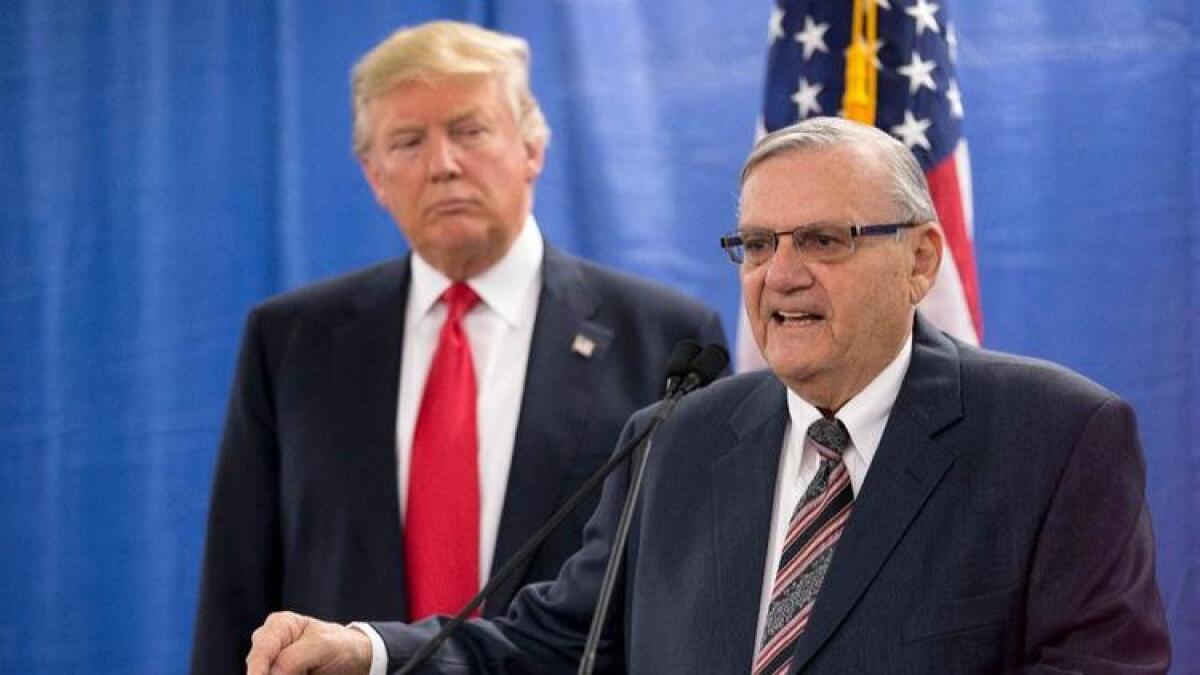
Former Arizona Sheriff Joe Arpaio, who last year was pardoned by President Trump in a case stemming from his enforcement tactics aimed at immigrants, announced Tuesday he will run for the open Senate seat in his home state.
“I am running for the U.S. Senate from the Great State of Arizona, for one unwavering reason: to support the agenda and policies of President Donald Trump in his mission to Make America Great Again,” Arpaio, 85, said on Twitter.
He’ll enter a Republican primary for the seat being vacated by Republican Sen. Jeff Flake.
Last summer, Trump pardoned Arpaio, who was convicted in July of criminal contempt for violating a federal court order to stop racially profiling Latinos.
It was Arpaio’s roughly quarter-century as sheriff that gave him a national reputation for his tough treatment of people suspected of being in the country illegally. Repeated court rulings against his office for civil rights violations cost local taxpayers tens of millions of dollars.
In the early 1990s, Arpaio directed construction of a tent city for immigration detainees, a measure he said was intended both to alleviate overcrowding and to underscore his aggressive enforcement measures. But it was open to the burning Arizona sun, and drew widespread criticism.
After Trump entered the presidential race in July 2015, Arpaio invited him to Phoenix to talk about a crackdown on illegal immigration. He endorsed Trump just before the first votes in the Iowa caucuses in 2016 and frequently spoke out on behalf of Trump’s campaign.
- Share via
President Trump ends controversial voter fraud commission
President Trump signed an executive order late Wednesday ending the voter fraud commission he launched last year as the panel faces a flurry of lawsuits and criticism from Democrats and Republicans alike.
Trump signed the order disbanding the commission “rather than engage in endless legal battles at taxpayer expense,” White House Press Secretary Sarah Huckabee Sanders said in a statement.
The Presidential Advisory Commission on Election Integrity, created by executive order in May with the stated goal of restoring confidence and integrity in the electoral process, has faced a barrage of lawsuits in recent months over privacy concerns, as the commission sought personal data on voters across the country.
- Share via
Congress returns to work with slimmer GOP majority to accomplish Trump’s agenda
Congress returns to work this week with unfinished business on spending, immigration and other crucial issues, but with an even narrower GOP majority that will make it tougher to move on President Trump’s agenda.
The House and Senate will convene Wednesday, swearing in the newly elected Democratic senator from Alabama, Doug Jones, and Minnesota’s Tina Smith to replace a fellow Democrat, Sen. Al Franken, who is resigning as the latest high-profile public figure sidelined by allegations of sexual misconduct. The change gives Republicans only a one-seat margin in the Senate.
Trump, fresh off passage of the GOP tax cuts bill, is pushing lawmakers to pivot quickly on his new year priorities of infrastructure investment and immigration, as well as his foreign policy agenda.
But another legislative victory seems far off. Republicans have struggled to hold their majority together and Congress first must tackle critical stalled agenda items that leaders punted to 2018.
- Share via
Trump threatens to cut off U.S. aid to Palestinians
President Trump on Tuesday angrily threatened to cut off U.S. aid to Palestinians as punishment for what he called their failure to show “appreciation or respect” to the United States.
Writing on Twitter, the president compared the Palestinians to Pakistan, a nuclear-armed ally that abruptly drew his ire this week and a similar threat to drastically curtail aid.
He accused the Palestinians of recalcitrance in what he described as their refusal to negotiate a peace deal with Israel.
Palestinian officials have said they can no longer use Washington as a broker to restart peace talks with Israel following Trump’s Dec. 6 decision to overturn decades of U.S. policy and recognize the disputed city of Jerusalem as the capital of Israel, and ultimately to move the U.S. Embassy there.
The Palestinians also claim part of Jerusalem as the capital of an eventual independent state. Until now, the United States and most of the world agreed the city’s political status was a matter to settle in final peace talks.
The United Nations General Assembly overwhelmingly condemned any effort to recognize Jerusalem as Israel’s capital, and the Palestinian leadership said it would not meet with Vice President Mike Pence, who had planned a trip to the region. That trip is on hold.
“[W]e pay the Palestinians HUNDRED [sic] OF MILLIONS OF DOLLARS a year and get no appreciation or respect,” Trump wrote on Twitter. “[W]ith the Palestinians no longer willing to talk peace, why should we make any of these massive future payments to them?”
In response to Trump’s tweet, Hanan Ashrawi, a senior Palestinian official, issued a statement saying: “Palestinian rights are not for sale. By recognizing Occupied Jerusalem as Israel’s capital Donald Trump has not only violated international law, but he has also singlehandedly destroyed the very foundations of peace and condoned Israel’s illegal annexation of the city.”
“We will not be blackmailed,” she said. “President Trump has sabotaged our search for peace, freedom and justice. Now he dares to blame the Palestinians for the consequences of his own irresponsible actions!”
The United States does not pay large amounts of money directly to the Palestinian Authority, the government that rules over parts of the Palestinian West Bank. Instead, most money goes to the U.N., refugee or aid agencies and even Israel to pay for roads, welfare, schools, security and other Palestinian projects.
The U.S. ambassador to the U.N., Nikki Haley, said Tuesday that the administration was planning to cut off one of those organizations, the U.N. Relief and Works Agency, until the Palestinians “return to the negotiating table.”
UNRWA, which receives around $300 million annually from the U.S., for years has been the lifeline to hundreds of thousands of Palestinian refugees living in the West Bank and the Gaza Strip. It was not clear if Haley was threatening to cut all U.S. support for the agency.
Special correspondent Noga Tarnopolsky in Jerusalem contributed to this report.
- Share via
The White House stops short of calling for government overthrow in Iran
President Trump wants Iran to give its citizens “basic human rights” and “stop being a state sponsor of terror,” his top spokeswoman said, but the White House stopped short of calling for a change of government in Tehran.
“If they want to do that through current leadership, if that’s possible, OK,” White House Press Secretary Sarah Huckabee Sanders told reporters.
Sanders praised the “organic popular uprising,” which she said the widespread protests in Iran represented. The protests grew out of years of “years of mismanagement, corruption, and foreign adventurism have eroded the Iranian people’s trust in their leaders,” she said.
Earlier Tuesday, Trump called Iran’s government “brutal and corrupt” and wrote in a tweet: “The people have little food, big inflation and no human rights. The U.S. is watching!”
Trump also blamed President Obama for “foolishly” giving Iran money that he said went to fund terrorism. The money he referred to were funds belonging to Iran that had been frozen by the U.S. and were released as part of the deal in 2015, which blocked Iran’s development of nuclear weapons.
- Share via
Retirement of Utah Sen. Orrin Hatch clears the way for a Mitt Romney revival
The retirement of Utah’s senior senator, Orrin G. Hatch, opens the way for a widely expected Senate bid by Mitt Romney, the Republicans’ 2012 presidential nominee and a frequent critic of President Trump.
Although Romney previously served for two terms as governor of Massachusetts (and was raised in Michigan, where his father was governor and his mother ran for the Senate), he comes from a prominent Mormon family with strong ties to Utah. He also served as chief executive of the 2002 Salt Lake City Olympics. He’s viewed as a strong candidate for the Senate seat.
Romney’s criticisms of Trump, however, could prompt a challenge in a Republican primary. Trump was widely reported to have tried to convince Hatch to run for a seventh term, in part to head off a Romney candidacy.
Last month, Romney and Trump were on opposite sides of one of the biggest political fights of the fall — the battle over the Senate seat from Alabama. The president strongly supported Roy Moore, the Republican candidate who had been accused of sexual misconduct by several women. Romney called Moore “a stain on the GOP.”
On Tuesday, Romney tweeted praise for Hatch, but did not immediately reveal his own plans.
- Share via
Utah Republican Sen. Orrin Hatch announces he’ll retire at end of term, rather than seek reelection
- Share via
U.S. calls on Iran to unblock social media sites amid protests
The Trump administration is calling on Iran’s government to stop blocking Instagram and other popular social media sites as Iranians are demonstrating in the streets.
Undersecretary of State Steve Goldstein says the U.S. wants Iran to “open these sites.” He says Instagram, Telegram and other platforms are “legitimate avenues for communication.”
The United States is encouraging Iranians to use virtual private networks, known as VPNs. Those services create encrypted links between computers and can be used to access blocked websites.
Goldstein says the U.S. is still communicating with Iranians in Persian through State Department accounts on Facebook, Twitter and other platforms. He says the U.S. wants to “encourage the protesters to continue to fight for what’s right.”
Goldstein says the U.S. has an “obligation not to stand by.”
- Share via
Trump blasts Democrats in advance of immigration meeting
The day before a meeting of administration officials and congressional leaders on outstanding legislative business, President Trump accused Democrats of “doing nothing” to hammer out an immigration deal to protect from deportation people brought to the country illegally as children.
“Democrats are doing nothing for DACA — just interested in politics,” Trump wrote in a Tweet on Tuesday morning, referring to the Deferred Action for Childhood Arrivals program by its acronym.
House Minority Leader Nancy Pelosi and Senate Minority Leader Charles E. Schumer along with the Republican leaders, House Speaker Paul D. Ryan and Senate Majority Leader Mitch McConnell, are scheduled to meet on Wednesday at the Capitol with Trump’s legislative director, Marc Short, and budget director, Mick Mulvaney.
The White House on Tuesday said the meeting is to discuss separate spending caps on military and domestic programs. Yet the Democrats insist the discussion also must include a variety of legislative issues that Trump and Congress punted into the new year — on immigration, the budget, healthcare and more.
That stance reflects Democrats’ leverage: Republicans need Democratic votes to pass a government-funding bill and avert a federal shutdown when the current funding expires Jan. 19. Democrats especially want separate legislation replacing the Obama-era DACA program; Trump in September ordered a phase-out of the program, beginning March 6, and called on Congress to act before then on an alternative way to address the plight of the group.
However, Trump has demanded that any alternative must be part of a package including both money for a border wall and immigration limits. Democrats are opposed.
- Share via
Pakistan hits back after Trump accuses its leaders of ‘lies and deceit’
Pakistan lashed out Monday after President Trump accused its leaders of “lies and deceit” and suggested the United States would withdraw financial assistance to the nuclear-armed nation it once saw as a key ally against terrorism.
U.S. Ambassador David Hale was summoned to the Foreign Ministry to discuss the president’s statement, U.S. Embassy spokesman Richard Snelsire said. Pakistan lodged a strongly worded protest, according to two foreign office officials who spoke on condition of anonymity because they were not authorized to speak publicly.
Pakistan’s prime minister, Shahid Abbasi, called a Cabinet meeting for Tuesday and a meeting of the National Security Committee on Wednesday to discuss Trump’s New Year’s Day tweet.
It was the president’s latest broadside against Pakistan after a speech in August in which he demanded its leaders crack down on the safe havens enjoyed by Taliban militants fighting U.S.-backed forces in neighboring Afghanistan.
- Share via
Trump again cheers on Iran protests
President Trump expressed renewed support Sunday for protesters in Iran, declaring that “people are finally getting wise as to how their money and wealth is being stolen and squandered on terrorism.”
In a tweet from his Florida estate, Mar-a-Lago, the president said the nationwide economic protests that began on Thursday – and have taken on wider political overtones as they have grown in size --- were a signal that Iranians “will not take it any longer.”
The president’s earlier hailing of the protests drew condemnation from Iran’s government. A Foreign Ministry spokesman called his comments “deceitful and opportunistic.”
Following an overnight report of the first two fatalities stemming from the protests, Trump raised some eyebrows by expressing concern over human rights violations as authorities move to crack down on the demonstrations. During his first year in office, the president has shown scant inclination to press foreign governments to respect the fundamental rights of their citizens.
“The USA is watching closely for human rights violations!” Trump said in his tweet Sunday.
Some domestic critics have pointed to the president’s inclusion of Iranian nationals in his travel ban, suggesting he was more interested in bashing the Tehran government than in supporting freedom of speech in Iran.
Even some of the president’s allies said that supporting the protesters on social media did not amount to making policy. Sen. Lindsey Graham (R-S.C.) said he had urged Trump to give a national address laying out his Iran strategy.
“President Trump is tweeting very sympathetically to the Iranian people,” Graham said on CBS’ “Face the Nation.”
“But you just can’t tweet here. You have to lay out a plan.”
- Share via
Australian diplomat’s tip a factor in FBI’s Russia inquiry

An Australian diplomat’s tip appears to have helped persuade the FBI to investigate Russian meddling in the U.S. election and possible coordination with the Trump campaign, the New York Times reported Saturday.
Trump campaign advisor George Papadopoulos told the diplomat, Alexander Downer, during a meeting in London in May 2016 that Russia had thousands of emails that would embarrass Democratic candidate Hillary Clinton, the report said. Downer, a former foreign minister, is Australia’s top diplomat in Britain.
Australia passed the information on to the FBI after the Democratic emails were leaked, according to the Times, which cited four current and former U.S. and foreign officials with direct knowledge of the Australians’ role.
“The hacking and the revelation that a member of the Trump campaign may have had inside information about it were driving factors that led the FBI to open an investigation in July 2016,” the newspaper said.
White House lawyer Ty Cobb declined to comment, saying in a statement that the administration is continuing to cooperate with the investigation now led by special counsel Robert Mueller “to help complete their inquiry expeditiously.”
Papadopoulos has pleaded guilty to lying to the FBI and is a cooperating witness. Court documents unsealed two months ago show he met in April 2016 with Joseph Mifsud, a professor in London who told him about Russia’s cache of emails. This was before the Democratic National Committee became aware of the scope of the intrusion into its email systems by hackers later linked to the Russian government.
The Times said Papadopoulos shared this information with Downer, but it was unclear whether he also shared it with anyone in the Trump campaign.
- Share via
Trump offers fresh support for protesters in Iran as demonstrations continue
President Trump again offered support Saturday for anti-government protesters in Iran, where a third day of demonstrations, the largest in years, spilled across the country amid fears of a crackdown.
“Oppressive regimes cannot endure forever, and the day will come when the Iranian people will face a choice. The world is watching!” Trump wrote on Twitter.
Trump took a break from playing golf near his Mar-a-Lago resort in Florida to tweet clips from his speech to the United Nations General Assembly in September when he called for Iranian democratic reforms.
Iranian authorities warned of potential violence as the street demonstrations, which began over economic conditions, swelled into frustrations with the theocratic rule of Supreme Leader Ayatollah Ali Khamenei.
Trump has maintained a hawkish stance toward Iran, sharply criticizing the landmark nuclear disarmament accord that Tehran reached with then-President Obama and five other nations in 2015.
In October, Trump declined to certify the accord to Congress although the U.N. nuclear watchdog agency says Iran is complying with it.
Several conservative GOP senators signaled their support for Trump’s position and backed the protesters in Iran. Others in Congress did not immediately respond, however, amid conflicting reports over who had organized the demonstrations.
“Even after the billions in sanctions relief they secured through the nuclear deal, the ayatollahs still can’t provide for the basic needs of their own people,” said Sen. Tom Cotton (R-Ark.), a Trump ally and opponent of the nuclear deal.
“We should support the Iranian people who are willing to risk their lives to speak out against it,” he added.
Trump initially tweeted his support on Friday night. White House spokeswoman Sarah Huckabee Sanders issued a statement at that time as protests spread.
“There are many reports of peaceful protests by Iranian citizens fed up with the regime’s corruption and its squandering of the nation’s wealth to fund terrorism abroad,” Sanders said. “The Iranian government should respect their people’s rights, including their right to express themselves. The world is watching.”
- Share via
When it comes to U.S.-Russia relations, ‘it takes two to tango,’ Kremlin says
The deteriorating relationship between the United States and Russia is one of the biggest disappointments of 2017, Russian President Vladimir Putin’s spokesman told reporters today.
Russia would like to rebuild relations between the two adversaries, but “it takes two to tango,” Dmitry Peskov said today during a conference call with the press.
“We want and are looking for good mutually beneficial relations based on mutual respect, mutual trust with all countries, primarily with European ones, including the United States, but it is necessary to dance tango, as they say.”
Peskov blamed the ongoing anti-Russian “Russophobia” in Washington for playing a major role in blocking the two countries from moving forward in their relationship. U.S. investigations into the Trump presidential campaign’s alleged collusion with the Kremlin during the 2016 U.S. election and accusations that the Kremlin tried to interfere with the electoral process continue to cast a dark shadow over the relationship, he said.
Peskov told reporters that Moscow was “perplexed” by the investigations. The Kremlin has continued to deny having any involvement with the Trump campaign or doing anything to interfere with the American election.
“This is definitely a U.S. domestic affair, but in this case it naturally hurts our bilateral relations, which is regrettable,” Peskov said.
Relations between the U.S. and Russia have been categorized as the worst they’ve been since the end of the Cold War. This year, Washington and Moscow have engaged in a diplomatic tit-for-tat in which both sides have been forced to reduce diplomatic staff, embassy properties have been repossessed by the hosting countries and visa services have been interrupted. The U.S. diplomatic mission to Russia shrank from 1,200 personnel, including some Russian local staff, to just over 450 across all its three consulates and embassy in Moscow. In the U.S., Russia was forced to vacate its San Francisco consulate.
Moscow has also blamed anti-Russian sentiments on the recent decision by the International Olympic Committee to ban Russian teams from wearing their tricolor uniforms or flags during the upcoming games in South Korea. The international body accused some of the Russian national teams of doping.
- Share via
U.S. and Turkey resume reciprocal issuing of visas but frictions remain
The United States and Turkey began issuing reciprocal visas again on Thursday, more than two months after normal visa service was suspended in a dispute over the arrest of two U.S. diplomatic staffers in Istanbul — the latest friction between the two nominal allies.
The State Department said it was lifting the visa restrictions after it was assured by the Turkish government that U.S. Embassy employees would not be arrested when performing their official duties.
But the Turkish Embassy in Washington denied assurances were offered “concerning the ongoing judicial processes,” and suggested that the arrests were legal and justified.
“It is inappropriate to misinform the Turkish and American public that such assurances were provided,” the embassy said in a statement.
The dispute has aggravated the already tense relationship between the United States and Turkey, which is a member of the NATO military alliance. The two countries have clashed over U.S. support for Kurdish rebels in Syria and over Turkey’s demands that the U.S. extradite a Turkish cleric who lives in rural Pennsylvania.
After a failed coup attempt killed more than 250 people in July 2016, Turkey’s autocratic president, Recep Tayyip Erdogan, launched a harsh crackdown on his political opponents, arresting or firing tens of thousands of teachers, police, journalists, military officers and others.
Erdogan accused Fethullah Gülen, an Islamic educator and former political ally, of orchestrating the coup. Gulen, who has lived in a compound in the Pocono Mountains, has denied any involvement.
The Justice Department has so far denied Turkey’s repeated demands to extradite Gulen.
Erdogan raised the issue again at the White House in May, but his visit ended in a public relations disaster when his security guards brutally beat peaceful protesters outside the Turkish ambassador’s residence.
Two Turkish employees of the U.S. Consulate in Istanbul were arrested this fall for alleged ties to the 2016 coup attempt. The U.S. responded by suspending most visa services at its missions in Turkey in October. The Turkish government reciprocated in November.
State Department officials said they have repeatedly demanded more information about any formal charges against the two employees. They reiterated on Thursday that “serious concerns” about the allegations remained.
- Share via
Trump: China caught ‘RED HANDED’ allowing oil to reach North Korea

President Trump isn’t taking a holiday vacation from Twitter. In one of three tweets early on Thursday from his West Palm Beach golf club, he charged that China was “caught RED HANDED” allowing oil shipments to reach North Korean ports.
Pronouncing himself “very disappointed,” Trump in effect was acknowledging the failure of his months-long effort to convince China to clamp down further on energy shipments going to the isolated country, which relies heavily on Beijing, as a way to pressure North Korea to abandon its nuclear weapons program.
Trump’s tweet came after a South Korean newspaper published what it said were U.S. spy satellite images of Chinese ships selling oil to North Korean ships.
The United Nations Security Council, which includes China, has voted repeatedly to restrict fuel shipments to North Korea. Trump asked Chinese President Xi Jinping in November to cut off North Korea’s oil supply entirely, the American ambassador to the U.N., Nikki R. Haley, said at the time.
It is unclear if Trump’s admonishment of China was based on news reports or classified information he received from U.S. intelligence officials. There was no daily intelligence briefing on Trump’s public schedule Thursday. He is expected to return to Washington next week after spending the Christmas holiday and New Year’s Eve at his Mar-a-Lago resort in Palm Beach, Fla.
- Share via
President Trump again falsely claims he’s signed more bills than any president
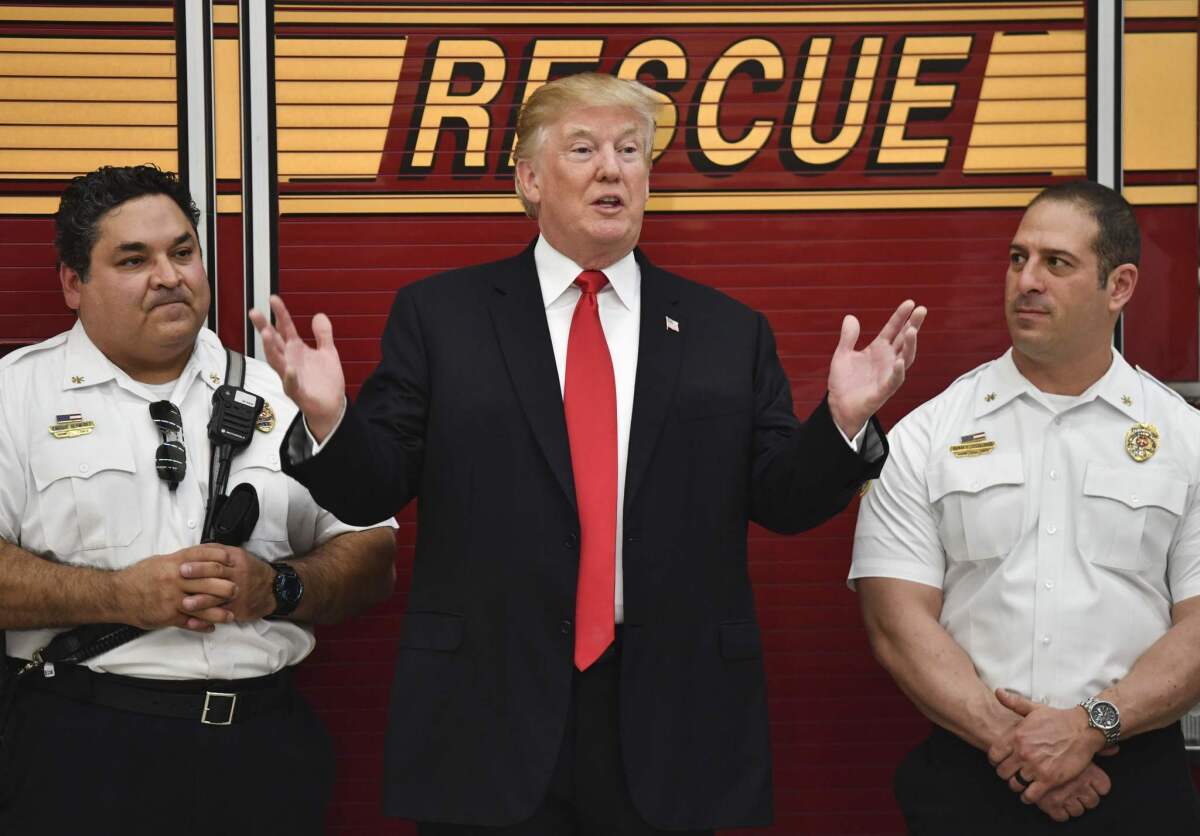
After another morning at his Florida golf club, President Trump visited firefighters and paramedics at a West Palm Beach firehouse and praised his own performance as president, including with a false boast.
Trump touted his administration’s work to roll back government regulations and cut taxes and claimed credit for the stock market hitting record highs. He also said he’s signed more bills into law than any other president, which isn’t true.
“We have signed more legislation than anybody,” Trump said, standing in front of a rescue vehicle inside the fire station.
“We have more legislation passed, including — the record was Harry Truman a long time ago, and we broke that record, so we got a lot done,” Trump said.
An analysis by GovTrack, a website that tracks bills in Congress, shows that Trump has signed the fewest bills into law at this point than any president in more than 60 years, back to Dwight D. Eisenhower.
- Share via
Trump administration urges Russia to reinstate monitors in Ukraine, ‘lower violence’

Secretary of State Rex Tillerson asked Russia on Wednesday to reinstate its military personnel at a monitoring station in eastern Ukraine intended to quell escalating bloodshed.
In a telephone conversation with his Russian counterpart, Sergei Lavrov, Tillerson also urged Russia to “lower the level of violence” and underscored the Trump administration’s “concern” over increased fighting in Ukraine, the State Department said in a statement.
Russia last week withdrew its monitors from the Joint Center on Coordination and Control, which is tasked with verifying a much-violated ceasefire between Ukrainian forces and Russia-backed separatists. Moscow cited what it called restrictions and “provocations” from Ukrainian authorities that made it impossible for the observers to do their jobs.
Washington has accused the pro-Russia forces of being responsible for many of the truce violations.
Late last week, the State Department also announced plans to provide Ukraine with lethal defensive weapons, including Javelin anti-tank missiles, a decision that angered Moscow.
The State Department statement did not say whether the weapons deal came up in Tillerson’s conversation with Lavrov.
The two also discussed North Korea, its “destabilizing nuclear program” and the need for a diplomatic solution “to achieve a denuclearized Korean peninsula,” the statement said. Russia has offered to serve as a mediator between Washington and Pyongyang, but direct talks do not seem likely at this point.
- Share via
U.S. sanctions two more North Korean officials for ballistic missile program
The Trump administration announced sanctions Tuesday against two more North Korean officials for their alleged role in Pyongyang’s expanding ballistic missiles program.
The Treasury Department “is targeting leaders of North Korea’s ballistic missile programs, as part of our maximum pressure campaign to isolate [North Korea] and achieve a fully denuclearized Korean Peninsula,” Treasury Secretary Steven T. Mnuchin said in a statement.
The nuclear-armed country tested an intercontinental ballistic missile last month that U.S. officials said appeared capable of reaching New York or Washington, a significant milestone in the country’s growing arsenal.
The Treasury Department identified the two North Korean officials as Kim Jong Sik, who “reportedly is a key figure” in the ballistic missile program and led efforts to switch missiles from liquid to solid fuel (which makes them easier to hide before launch), and Ri Pyong Chol, who was “reported to be a key official” in the development of intercontinental ballistic missiles.
The sanctions block banks, companies and individuals from doing any business with the targeted officials. It also allows the U.S. government to freeze any American assets owned by the officials.
On Friday, the United Nations Security Council unanimously voted to add more sanctions on North Korea, its third round this year. The new measures order North Koreans working abroad to return home within two years, and ban nearly 90% of refined petroleum exports to the country.
In a statement published Sunday by North Korea’s state-run KCNA news agency, the foreign ministry denounced the new U.N. sanctions as “an act of war.”
“We define this ‘sanctions resolution’ rigged up by the US and its followers as a grave infringement upon the sovereignty of our Republic, as an act of war violating peace and stability in the Korean Peninsula and the region and categorically reject the ‘resolution,’” it said.
- Share via
Salt Lake Tribune calls on Sen. Orrin Hatch to not seek reelection in scathing editorial
Perhaps the most significant move of Hatch’s career is the one that should, if there is any justice, end it. The last time the senator was up for reelection, in 2012, he promised that it would be his last campaign. That was enough for many likely successors, of both parties, to stand down, to let the elder statesman have his victory tour and to prepare to run for an open seat in 2018. Clearly, it was a lie.
- Share via
Christmas Eve, Trump on Twitter: New attacks on FBI official, decrying ‘Fake News’
President Trump launched a Christmas Eve attack on FBI Deputy Director Andrew McCabe, whom he accuses of favoritism toward his former opponent, Hillary Clinton, and also returned to a longtime favored theme, excoriating the news media for failing to sufficiently extol his accomplishments.
Trump, who is spending the holidays at his Florida resort, Mar-a-Lago, also sent Christmas greetings to deployed military personnel, praising them for success in the fight against terrorism.
The early-morning swipe at McCabe followed a flurry of tweets attacking the deputy FBI chief on Saturday. McCabe, who has been a lightning rod for Republican attacks on the FBI, is expected to retire early in the new year.
Critics say the president and his allies are in the midst of a systematic campaign to denigrate the FBI and special counsel Robert S. Mueller III, who is looking into potential collusion by the Trump campaign in Russia’s attempts to sway the 2016 presidential election.
In a pair of statements on Twitter, Trump again expressed scorn regarding news coverage of his administration. For months, the president has been particularly critical of reports regarding the Russia investigation and more recently has repeatedly complained he does not receive enough credit for a booming stock market.
In his video conference message to troops overseas, the president made apparent reference to the fight against the militants of Islamic State, who over the last year have lost most of the territory they previously controlled in Iraq and Syria, including former strongholds in Mosul and Raqqah.
“We’re winning,” Trump told military personnel deployed in Qatar, Kuwait, Guantanamo Bay and aboard the guided missile destroyer Sampson.
Reporters traveling with the president heard his address, but were ushered from the room before he took questions from the troops. The president often breaks with longtime custom and makes politically charged statements at events in which he addresses military personnel.
- Share via
Trump’s Wells Fargo tweet cited in court hearing as reason to remove Mulvaney as CFPB acting chief
A recent tweet by President Trump about possible penalties against Wells Fargo & Co. was cited during a court hearing Friday as a reason for removing White House official Mick Mulvaney as acting director of the Consumer Financial Protection Bureau.
The attorney for Leandra English — the bureau’s deputy director who has said she is the rightful acting head — said Trump’s tweet showed he was trying to exercise improper influence over the independent consumer watchdog.
“I think that [tweet] shows you this isn’t just some hypothetical concern,” the attorney, Deepak Gupta, told Judge Timothy J. Kelly of the U.S. District Court for the District of Columbia during a nearly two-hour hearing.
- Share via
Trump administration recognizes Honduran president’s reelection
The Trump administration on Friday formally recognized the incumbent president of Honduras, conservative Juan Orlando Hernandez, as the winner of a bitterly contested presidential election held last month.
In a statement, the State Department congratulated Hernandez while also acknowledging widespread irregularities in the Nov. 26 vote and calling for a “robust national dialogue” to overcome political discord in the Central American country, a close ally of the administration.
The Organization of American States, which monitored the election, said it was so flawed that only a new round of voting could establish a “fair and transparent” outcome. But the U.S. rejected that determination.
Uproar over the contest led to demonstrations in Honduras that left numerous civilians dead after state security forces opened fire on the protests. Activists and others voiced criticism Friday of the administration’s decision.
Rep. Jim McGovern (D-Mass.), a leading Democratic voice on Central American issues, said he was “angry and deeply disturbed” by the State Department decision.
“The recent elections in Honduras were deeply flawed, chaotic and marred by numerous irregularities,” McGovern said. U.S.-Honduran cooperation on matters such as drug-trafficking, violence and immigration requires “a credible, legitimate government that has the support of its people,” in Honduras, McGovern said.
Hernandez’s victory also was controversial because it was the first time a sitting president was allowed to run for re-election, barred until now by the Honduran Constitution.
- Share via
Senate Leader Mitch McConnell says fixing DACA is ‘no emergency’ until March
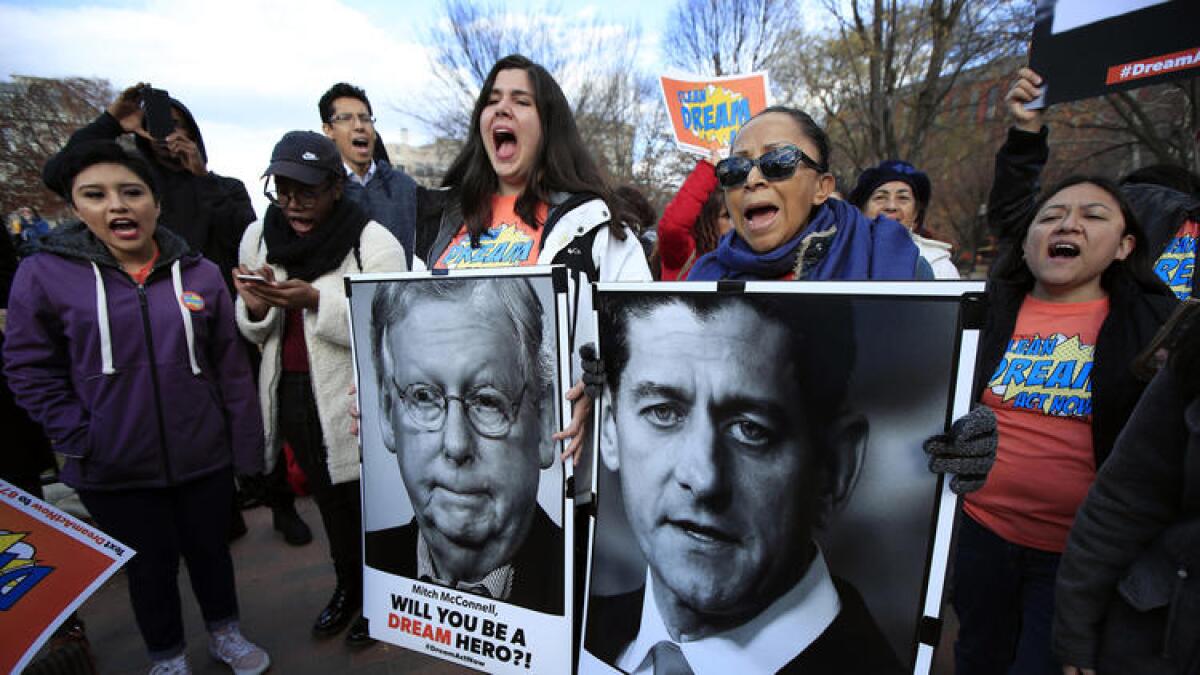
Senate Majority Leader Mitch McConnell said Friday he’s committed to allowing a vote on a bill for so-called “Dreamers” in January, but sees no rush to resolve the deportation threat posed by President Trump’s decision to end a program protecting immigrants brought to the country illegally as children.
“There isn’t that much of an emergency there,” he said. “There is no emergency until March. We’ll keep talking about it.”
Trump called for phasing out by March the Obama-era program that allows the young immigrants, many of them longtime residents, to get two-year deferrals of any deportation threat so they can legally attend school or work. Beneficiaries must be vetted for security purposes.
Trump told Congress to come up with a legislative alternative for the Deferred Action for Childhood Arrivals program, which President Obama created by executive order, to protect those currently eligible.
A bipartisan Senate group has been working with the White House, but talks stalled this week amid administration demands for curbs on legal immigration flows in exchange for protecting the DACA recipients.
Meanwhile, Dreamers and immigrant advocates stormed the Capitol in recent days pressing for the help promised by Trump and Democratic congressional leaders that failed to materialize in the year’s final legislation.
Advocacy groups say more than 120 immigrants each day are falling out of compliance without DACA renewals, putting them at risk of deportation. The number that is projected to swell to more than 1,000 a day in March.
“We’ve been gridlocked on this issue for years,” McConnell said. “We want to have a signature. We don’t just want to spin our wheels and have nothing to show for it.”
- Share via
President Trump signs tax bill

President Trump on Friday morning signed a sweeping tax-cut measure — his first major legislative achievement — before heading off for a Christmas vacation at his Mar-a-Lago property in Palm Beach, Fla.
The president also privately signed a short-term spending bill to fund government operations through Jan. 19. Congress approved it Thursday, after Republican leaders were unable to bridge differences in their own party as well as with Democrats to get agreement on funding for the full fiscal year. The stopgap bill punts fights on immigration and other issues to January.
The tax bill, approved earlier this week in Congress in largely party-line votes, slashes corporate tax rates from 35% to 21% and also includes a host of other provisions for individuals, all intended to boost the economy.
Critics point to nonpartisan analyses showing that the package, including changes greatly reducing the number of estates subject to taxes, steers the bulk of tax benefits to top earners and the wealthy, including Trump, despite his repeated claims that he’ll take a hit.
Trump signed the bill quietly Friday, but held a public ceremony with Republican lawmakers on Wednesday after the bill’s passage; he also tweeted about the measure extensively. He is expected to hold another public ceremony after the New Year’s holiday.
- Share via
Pelosi urges Ryan to prevent Republicans from curtailing House’s Russia probe
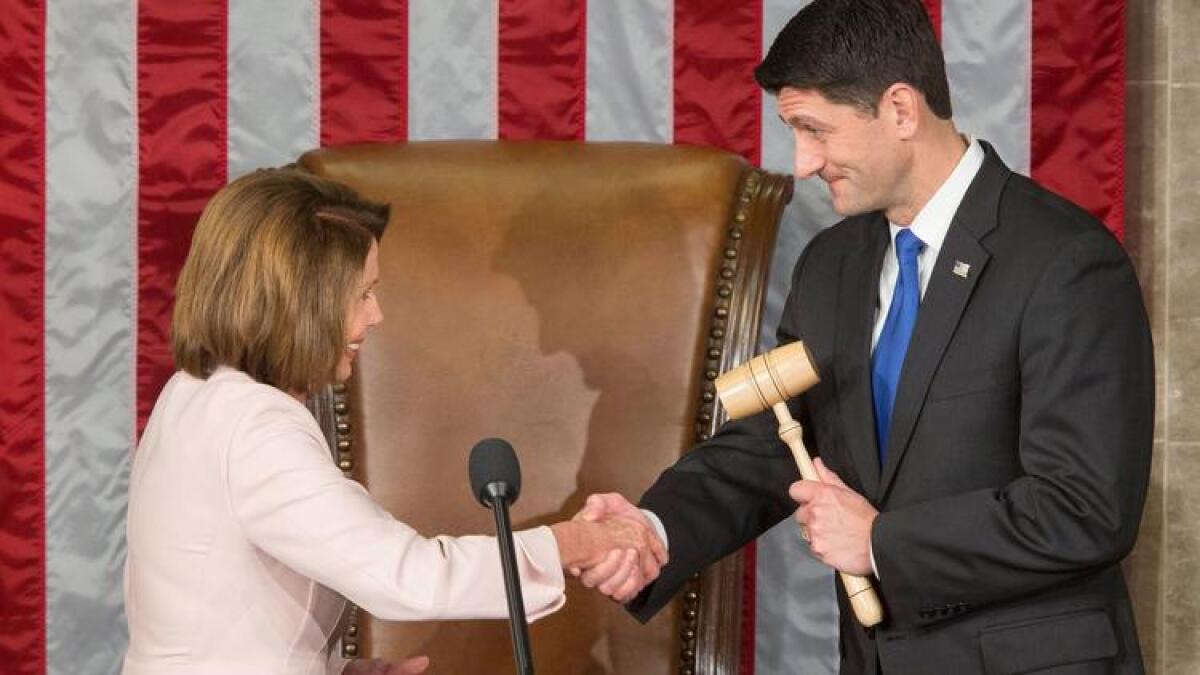
House Democratic Leader Nancy Pelosi sent a letter to Speaker Paul D. Ryan on Friday urging him to ensure the House’s investigation into Russian interference with last year’s presidential campaign is not “cut short.”
“The American people deserve a comprehensive and fair investigation into Russia’s attacks,” wrote Pelosi, of San Francisco, in her letter. “Political haste must not cut short valid investigatory threads.”
The House Intelligence Committee has been probing the issue since March 1, and Democrats have repeatedly warned that Republicans are trying to wrap up its work prematurely. Pelosi said Ryan, a Republican from Wisconsin, should “take urgent action to ensure this investigation can continue.”
AshLee Strong, a spokeswoman for Ryan, said Pelosi simply wants “to see this investigation go on forever” in order to “suit her political agenda.”
“Whether it concludes next month, next year, or in three years, she will say it is too soon,” Strong said in a statement. She added, “The investigation will conclude when the committee has reached a conclusion.”
The committee’s work is led by Rep. K. Michael Conaway (R-Texas). His spokeswoman, Emily Hytha, said he “remains committed to conducting this investigation as thoroughly and expeditiously as possible.”
With more interviews scheduled, the investigation shows signs of extending into next year, Bloomberg reported Friday.
- Share via
Congress votes to avert government shutdown, but Senate fails to pass disaster aid package
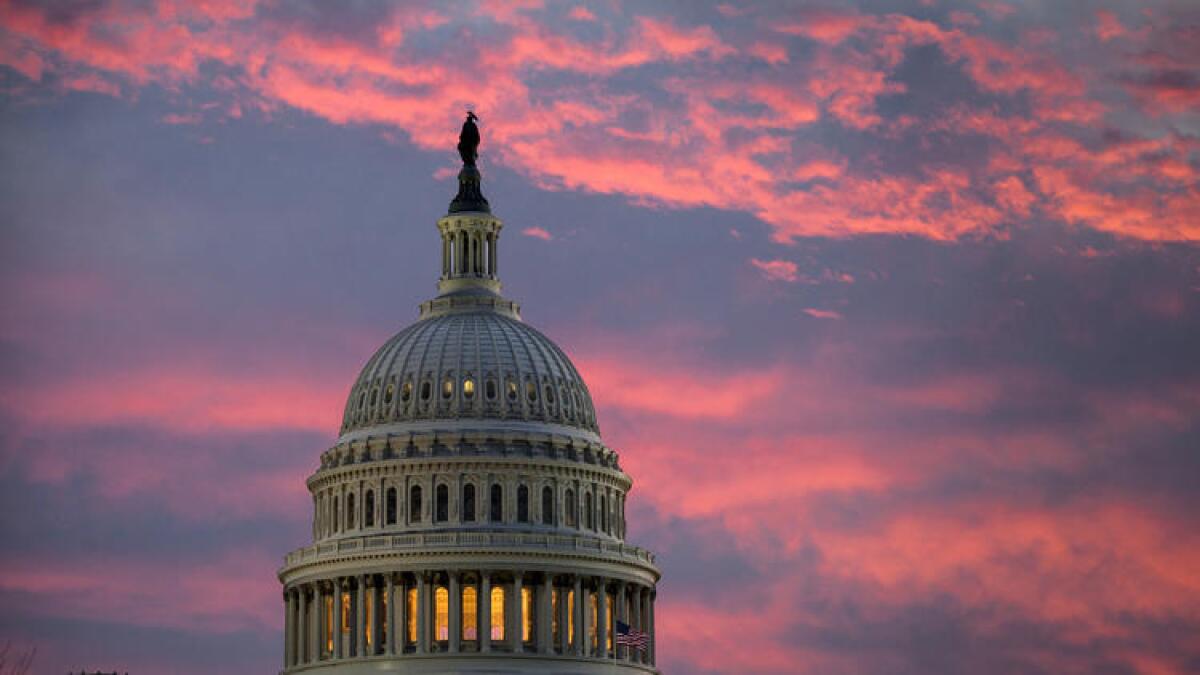
Congress approved a temporary spending bill to prevent a government shutdown, but failed to complete work on an $81-billion disaster aid package to help California, Gulf Coast states and Puerto Rico recover from wildfires and hurricanes, as lawmakers scrambled Thursday to wrap up business before a Christmas break.
The stopgap measure continues federal operations for a few more weeks, setting up another deadline for Jan. 19. But it left undone a long list of priorities that members of both parties had hoped to finish this year.
- Share via
Wells Fargo says raises were not linked to tax bill passage — then backtracks
Wells Fargo & Co.’s move to raise its minimum pay to $15 an hour was part of a long-term plan and not related to the passage of the Republican tax overhaul as the company implied, said a bank spokesman, who later backtracked and stated the hikes were a result of the bill’s approval.
The bank was among several large corporations to publicly announce pay raises or new investments immediately following the final House vote in an apparent public relations offensive to boost the popularity of the tax bill
The San Francisco bank had implied the direct linkage to the tax legislation in a news release Wednesday, shortly after Congress passed the tax overhaul, which slashes the corporate tax rate to 21% from 35% starting Jan. 1.
- Share via
Obamacare signups beat expectations, despite Trump administration’s opposition

Despite Trump administration efforts to discourage people from signing up, the number of people enrolling for Affordable Care Act coverage nearly hit last year’s level, the government revealed Thursday.
The 8.8 million people who enrolled in the 36 states that use the federal government’s healthcare.gov system significantly exceeded most forecasts.
The Trump administration stopped most outreach and other efforts this year aimed at getting people to sign up. The president also repeatedly said publicly that Obamacare was “dead.”
Open enrollment continues in California and several other states that run their own healthcare marketplaces. The figures from the federal government indicate that when those states wrap up for the year, the number of people covered by Obamacare will be nearly the same as in 2017.
- Share via
U.N. General Assembly overwhelmingly condemns U.S. policy change on Jerusalem despite Trump’s threats
The United Nations General Assembly overwhelmingly voted Thursday to condemn President Trump’s decision to recognize Jerusalem as the capital of Israel, despite Trump’s threats to punish countries that voted against the U.S. position.
The resolution passed in an emergency session at U.N. headquarters in New York with 128 in favor, nine opposed and 35 abstentions.
The nonbinding resolution demands that Washington rescind its declaration, which included a plan to transfer the U.S. Embassy in Israel from Tel Aviv to Jerusalem in coming years.
The resolution value is mostly symbolic, showing how isolated the U.S. is in the move.
Nikki Haley, the U.S. ambassador to the U.N., warned this week that she would be “taking names” of countries that opposed the U.S., and Trump on Wednesday suggested he might cut U.S. aid to governments that voted in favor of the resolution.
”Let them vote against us,” Trump said. “We’ll save a lot. We don’t care.”
The U.S. recognition of Jerusalem reversed decades of international consensus on the political status of the divided city. Palestinians claim East Jerusalem as their capital in a future independent state.
Palestinian Foreign Minister Riad Malki said the U.N. was facing an “unprecedented test” and that history would remember those who “stand by what is right.”
- Share via
Democrats defend Robert Mueller, saying Russia investigation must be allowed to continue

House Democrats said they will fight Republican attempts to “discredit and undermine” the work of special counsel Robert S. Mueller III, who is investigating whether President Trump’s associates helped Russian meddling in last year’s election.
“There is an organized effort by Republicans, in concert with Fox News, to spin a false narrative and conjure up outrageous scenarios to accuse special counsel Mueller of being biased,” Rep. Maxine Waters (D-Los Angeles) said.
Trump has said he has no plan to fire Mueller, but Democrats are alarmed by escalating criticism of the special counsel’s work.
“Why is the president afraid of the facts and the truth?” Rep. Dan Kildee (D-Mich.) said.
He added, “No matter what the facts are, we’re satisfied if the investigation is complete.”
A letter of support signed by 171 Democratic members of Congress will be sent to Deputy Atty. Gen. Rod Rosenstein, who appointed Mueller, a former FBI director, and oversees his investigation.
Rosenstein has defended Mueller in the face of Republican criticisms.
- Share via
U.S. blacklists Myanmar army general who it says oversaw atrocities against Rohingya Muslims
The Trump administration on Thursday blacklisted a Myanmar army general who it said oversaw human rights abuses committed by security forces against Rohingya Muslims.
Imposing economic sanctions against the general, Maung Maung Soe, was the toughest action the United States has taken in response to a brutal army offensive that Secretary of State Rex Tillerson has described as ethnic cleansing.
In a statement, the Treasury Department said it had examined “credible evidence of Maung Maung Soe’s activities, including allegations against Burmese security forces of extrajudicial killings, sexual violence and arbitrary arrest as well as the widespread burning of villages.”
The Rohingya are an ethnic and religious minority of about 1 million people in predominantly Buddhist Myanmar, also known as Burma. The United Nations says that more than 640,000 Rohingya have fled the country since August, after the army launched “clearance operations” in response to attacks carried out by a Rohingya insurgent group against security forces.
Rohingya refugees in crowded camps in neighboring Bangladesh have described horrific violence by Myanmar forces, including mass rapes, summary executions and children being burned alive.
The aid group Doctors Without Borders estimates that 6,700 people were killed in the first month of the operation. Myanmar authorities deny committing atrocities and say that only a few hundred “fighters” were killed.
Maung Maung Soe was chief of the army’s Western Command, which carried out the offensive. He was transferred from his position last month, according to news reports.
He was one of 13 individuals worldwide who were blacklisted Thursday under a new U.S. law that gives the Treasury Department authority to target officials for human rights abuses and corruption. Others included former Gambian President Yahya Jammeh; Gulnara Karimova, daughter of the late Uzbekistan dictator Islam Karimov; and Artem Chaika, son of Russia’s prosecutor-general.
“Today, the United States is taking a strong stand against human rights abuse and corruption globally by shutting these bad actors out of the U.S. financial system,” said Treasury Secretary Steven T. Mnuchin.
The sanctions freeze any assets Maung Maung Soe holds in the United States and bars Americans from doing business with him. It is also a sign of how quickly U.S. relations with Myanmar have soured.
Under the Obama administration, the United States forged closer ties with the former military dictatorship and eased economic and political sanctions as the country began implementing democratic reforms.
But Myanmar, which does not regard the Rohingya as citizens, has lashed out at the international community over the current crisis. It has jailed journalists, blocked access to affected areas in the western state of Rakhine and this week barred a U.N. human rights investigator from entering the country.
Rohingya activists said the U.S. action would not have much effect on a country that survived under economic sanctions for years.
“It is the whole military institution that has a policy to persecute these people,” said Nay San Lwin, a Rohingya activist and blogger in Germany. “According to the U.S.’s own definition, the army is carrying out ethnic cleansing. They have a responsibility to protect these people. Sanctions on one person are really not enough.”
- Share via
‘Dreamers’ will have to wait until next year for Congress’ long-promised protections

A promised year-end deal to protect the young immigrants known as Dreamers from deportation collapsed Wednesday as Republicans in Congress — fresh off passage of their tax plan — prepared to punt nearly all remaining must-do agenda items into the new year.
Congressional leaders still hope that before leaving town this week they can pass an $81-billion disaster relief package with recovery funds for California wildfires and Gulf Coast states hit during the devastating hurricane season. But passage even of that relatively popular measure remained in doubt as conservatives balked at the price tag.
Rather than finish the year wrapping up the legislative agenda, the GOP majorities in the House and Senate struggled over their next steps.
- Share via
Chants of protest drown out any caroling this holiday season at the Capitol

Outside the U.S. Capitol, the lights on a towering Christmas tree are flipped on each evening, giving the Engelmann spruce a festive twinkle; inside the marble halls, wreaths and garlands decorate doorways and alcoves ahead of the holidays.
But the spirit of the season has been punctuated by other sights: a Jumbotron parked across from the Capitol reflecting pool broadcasts images of young immigrants who face deportation; Little Lobbyists, children with complex medical needs, were featured in a recent news conference; protesters filed into the visitor galleries to shout against the Republican tax plan.
While it’s beginning to look a lot like Christmas at the Capitol, it’s also shaping up to be a holiday season of protest.
- Share via
Tax bill simplifies filing for some but complicates it for others — and don’t count on that postcard
A priority of the Republicans’ tax overhaul was simplification, and they drove home the point this fall with an omnipresent prop: a red-white-and-blue postcard.
“We’re making things so simple that you can do your taxes on a form the size of a postcard,” House Speaker Paul Ryan (R-Wisc.) said last month, pulling one from his jacket pocket as he and Republican leaders unveiled their bill.
They gave a couple of the cards to President Trump at a White House meeting a few hours later and flashed them often during news conferences and TV interviews in the coming days.
- Share via
Top U.N. human rights official reportedly won’t seek reelection
The top United Nations official for human rights, who has frequently criticized the Trump administration, has reportedly decided not to seek a second term, saying his work had become untenable.
Zeid Raad Hussein, the U.N. high commissioner for human rights, notified his staff in an email that was obtained by several news outlets, including Agence France-Presse.
Staying when his four-year term is up for renewal at the end of August “might involve bending a knee in supplication,” AFP quoted Hussein’s email as saying.
Hussein is a Jordanian prince who has criticized, among other things, President Trump’s attempts to ban visitors or refugees from six predominantly Muslim countries.
The news comes a day before the U.N. General Assembly is expected to vote on a nonbinding resolution condemning the Trump administration’s formal declaration of Jerusalem as the capital of Israel, a decision that went against international consensus.
Nikki Haley, the U.S. ambassador to the U.N., has warned she will be “taking names” of those who vote against the United States on Thursday.
Trump echoed that sentiment Wednesday, voiced support for Haley and implying to reporters that he would consider cutting off U.S. aid to countries that vote against the U.S.
“Well, we’re watching those votes,” Trump said. “Let them vote against us. We’ll save a lot. We don’t care.”
On Monday, the United States lost a Security Council vote 14-1 on a binding resolution that would have required Washington to rescind its declaration. Haley then vetoed the resolution.
- Share via
Top Democrat warns Trump not to fire Mueller or interfere with his investigation
Sen. Mark Warner of Virginia, one of the top Democrats involved in the congressional inquiries into Russian interference in last year’s election, said Wednesday that any attempt by President Trump to interfere with the separate criminal investigation would be a “gross abuse of power.”
Warner, who is vice chairman of the Senate Intelligence Committee, delivered his warning from the Senate floor as Republicans escalate their criticism of special counsel Robert S. Mueller III and his team of prosecutors and FBI agents.
Some Democrats believe Trump is laying the groundwork to fire Mueller even though the president has publicly denied it. Mueller was appointed in May after Trump fired FBI Director James B. Comey.
“In the United States of America, no one, no one is above the law, not even the president,” Warner said. “Congress must make clear to the president that firing the special counsel or interfering with his investigation by issuing pardons of essential witnesses is unacceptable and would have immediate and significant consequences.”
Some Democrats say the White House may try to in effect short-circuit the Mueller investigation by replacing Deputy Atty. Gen. Rod Rosenstein, who is the only official empowered to fire Mueller.
Rosenstein recently told Congress that the special counsel is acting “appropriately” and that he would not dismiss Mueller without just cause.
- Share via
‘We have essentially repealed Obamacare,’ Trump says after tax bill passes
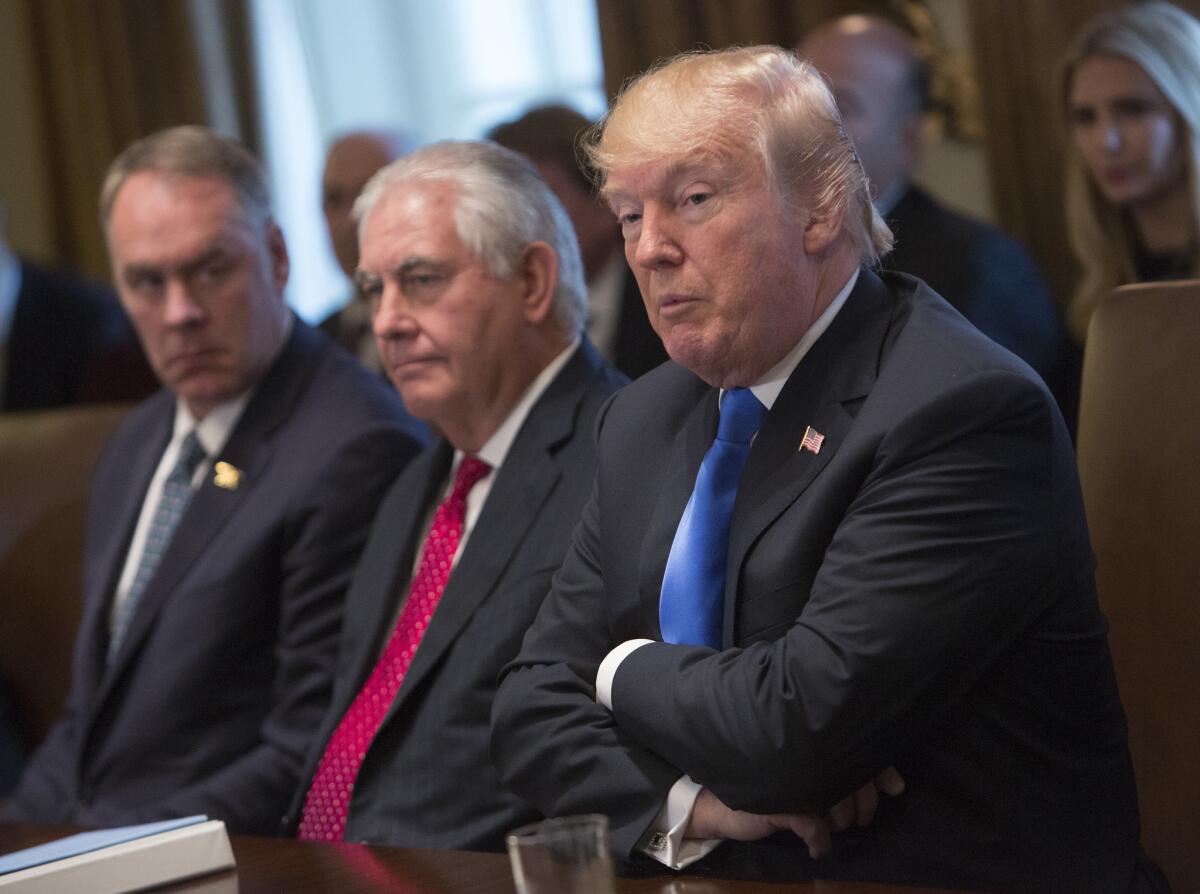
President Trump is celebrating Republicans’ passage of the tax overhaul bill as a two-fer: On Wednesday, in addition to tax cuts, he checked off his promise to repeal Obamacare, pointing to a provision in the bill to end the penalty on Americans who don’t get health insurance.
“We have essentially repealed Obamacare,” Trump told reporters during a Cabinet meeting at the White House.
Other provisions of the 2010 Affordable Care Act are still in place, and Trump and congressional Republicans failed completely on the “replace” half of their vow to “repeal and replace” the program.
In Trump’s view, however, stripping away the law’s “individual mandate” to get insurance or else pay a tax penalty amounts to repeal of the whole law. Congressional analysts have said that millions of people would lose insurance as a result, either by choice or because they cannot afford it without subsidies, and that premiums would increase for others as younger, healthy people drop coverage.
“We will come up with something much better,” Trump said, adding that block grants to states could be one approach.
By his comments, Trump tacitly acknowledged that repeal of the mandate is likely the best he can do following Republicans’ failure this year to agree on a repeal-and-replace bill.
Looking back on his first year, Trump also boasted of his administration’s efforts against the Islamic State and increased immigration enforcement. He said he had not given up on funding a border wall or tightening immigration law to limit citizens’ ability to resettle foreign relatives in the country. He said he would “very shortly” visit the border with Mexico near San Diego to see wall prototypes that have been built.
He didn’t answer a reporter’s shouted question about how he would personally benefit from the tax bill.
- Share via
House gives final OK to GOP tax plan, sending it to Trump
Congress gave final approval to the GOP tax plan Wednesday, 224-201, after the House took an unusual do-over vote to clear up differences with the Senate-passed bill.
The $1.5-trillion package now heads to President Trump, who plans to sign it into law.
The House had approved the tax bill on Tuesday but was forced to take another vote Wednesday because a couple of provisions in the version it approved were found to be in violation of Senate procedures. Those provisions were dropped before the Senate gave its approval early Wednesday.
Critics complained the Republicans rushed to pass the sweeping tax plan to deliver Trump a year-end legislative victory, but supporters shrugged off the problems as minor.
The tax plan dramatically cuts corporate rates and provides some individual rate reductions, overhauling the tax code for the first time in 30 years.
- Share via
Trump administration effort to block immigrant from having an abortion fails
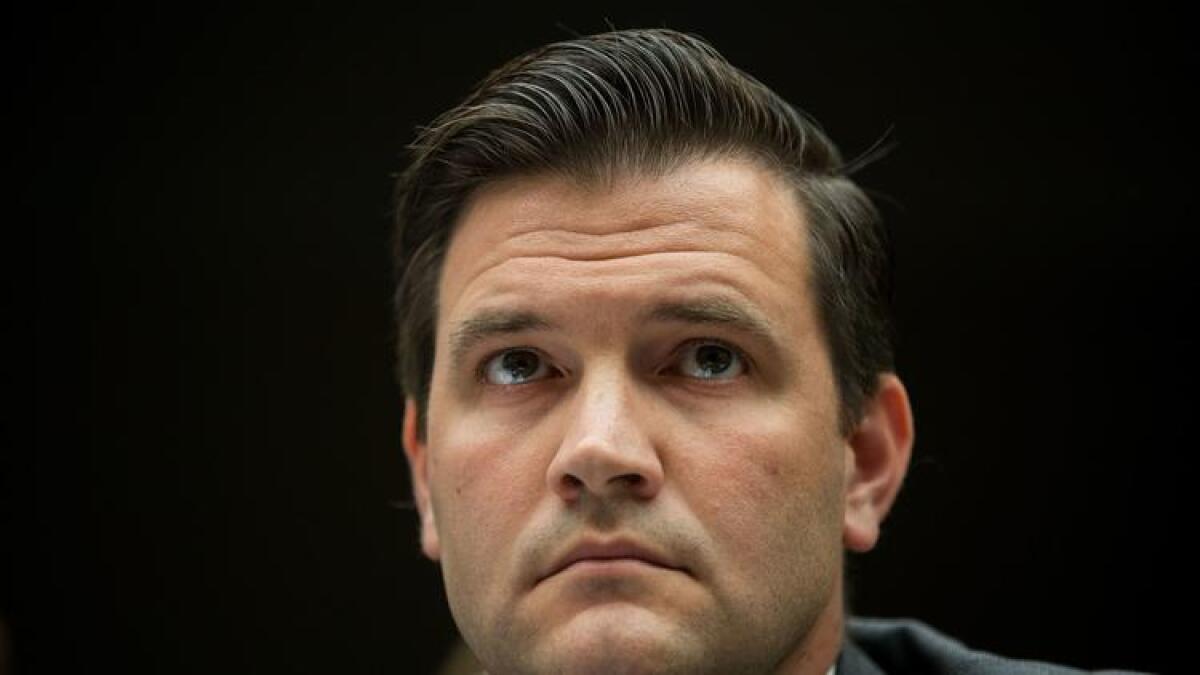
President Trump’s lawyers rushed to the Supreme Court and U.S. appeals court in Washington on Monday evening to file emergency appeals seeking to prevent an immigrant in detention, dubbed Jane Roe in court, from having an abortion.
That set the stage for a legal showdown on whether the administration can block pregnant minors in custody from choosing to have an abortion.
But the legal clash, which the administration has seemed eager to have, fizzled out Tuesday when the government’s lawyers admitted the “17-year-old unaccompanied minor” in their custody was actually 19. They said they had obtained her birth certificate and realized she was not a minor after all.
As a result, Roe, who is 10 weeks pregnant, will no longer be held in a detention center for immigrant minors, and will not be subject to an administration policy that tries to prevent minors in immigration detention from having abortions.
Administration lawyers told appeals court judges Tuesday night that Roe was being sent to a facility for adults and likely would be released until her immigration status can be resolved.
In a brief order, the D.C. Circuit Court agreed to put the case on hold, but told government attorneys to confirm that “she will be permitted to obtain an abortion.”
The administration had earlier tried to delay another young woman, referred to in court as Jane Poe, from having an abortion, but officials relented on Monday because she was 22 weeks pregnant and nearing the time limit for a legal abortion.
- Share via
Senate panel rejects Trump’s pick to lead Export-Import Bank, a leader in the effort to shut it down
A Senate committee on Tuesday rejected President Trump’s nominee to lead the Export-Import Bank, extending the chaos at the embattled agency whose job is to help U.S. companies sell their goods abroad.
Two Republicans joined all Democrats on the Senate Banking Committee in voting against former Rep. Scott Garrett (R-N.J.) to be the bank’s president.
Garrett had been a vocal critic of the Ex-Im Bank and a leader of a conservative effort that shut the bank down for five months in 2015 by blocking its congressional authorization. He and other bank opponents branded the bank’s aid as crony capitalism.
- Share via
Congress proposes $81-billion disaster aid package, including funds for California wildfires
Congress is set to consider an $81-billion disaster aid package that includes wildfire recovery money for California and other Western states as well as hurricane relief with a price tag reflecting a year of record-setting natural calamities.
The legislation, the text of which was released late Monday, would provide almost twice as much as the $44 billion the White House sought last month to cover relief efforts along the Gulf Coast and in the Caribbean.
Republican congressional leaders added more money after California lawmakers objected that the administration had failed to include help for areas damaged by wildfires and Democrats protested that the overall amount President Trump asked for was insufficient.
- Share via
Senate investigating Green Party candidate Jill Stein in Russia probe

The Green Party’s 2016 presidential nominee says she’s cooperating with a request for documents from a Senate committee probing Russian meddling in the U.S. election.
Jill Stein has acknowledged attending a 2015 event in Moscow celebrating the anniversary of a state-sponsored Russian news organization. The event has attracted investigators’ attention because former national security advisor Michael Flynn also attended and sat beside Russian President Vladimir Putin.
Stein says in a statement Tuesday she’s sharing “all communications relevant” to the Senate Intelligence Committee’s mission.
The Massachusetts physician says she accepted an invitation to attend the Moscow event and that her campaign did not receive payment or reimbursement for the trip.
Stein received about 1% of the popular vote in the 2016 election.
- Share via
White House blames North Korea for worldwide ‘WannaCry’ cyber attack

The White House officially blamed North Korea on Tuesday for the cyberattack in May known as WannaCry that infected hundreds of thousands of computers in 150 countries, affecting healthcare, financial services and vital infrastructure.
Thomas P. Bossert, assistant to the president for homeland security and counter-terrorism, noted in a briefing with reporters that the “consequences were beyond economic.” He warned that North Korea’s “malicious behavior is growing more egregious.”
Bossert did not specify what evidence American officials have to blame North Korea, citing security issues, but he cited the country’s prior attacks as revealing hallmarks of how Pyongyang and its network of hackers operates. He said other allied countries had joined the United States in making the determination.
The administration did not announce any penalties on the regime, which is already subject to severe sanctions over its nuclear program.
“They want to hold the entire world at risk,” Bossert said of North Korea’s rulers, referring to the nation’s nuclear and missile provocations as well as its alleged cyberattack.
Given its isolation and international sanctions, North Korea is desperate for funds. Bossert said the country did not appear to make much money on the ransom attack, as word spread that paying a ransom did not result in getting computers unlocked. Its primary goal, he said, was spreading chaos.
Bossert and Jeanette Manfra, assistant secretary of homeland security for cybersecurity and communication, said the United States, through a combination of preparation and luck, escaped the worst of the attack, as a patch to the malware was found before U.S. companies and other interests were severely crippled.
However, Manfra said, “We cannot be complacent.” Bossert added, “Next time we’re not going to get so lucky.”
Manfra praised Microsoft and Facebook for their efforts to combat WannaCry and to block more recent attempts to hack U.S. systems. She and Bossert urged more cooperation and information-sharing from American and multinational companies, arguing a united front is vital to protecting against bad actors who do not differentiate between government and business.
Bossert rejected criticism that the the Trump administration has more aggressively called out North Korean cyberattacks than it has Russia’s meddling in the 2016 election. He said the administration has continued the national emergency initiated by President Obama.
- Share via
GOP lures some mountain bike groups in its push to roll back protections for public land
When their vision of creating a scenic cycling trail through a protected alpine backcountry hit a snag, San Diego area mountain bikers turned to an unlikely ally: congressional Republicans aiming to dilute conservation laws.
The frustrations of the San Diego cycling group and a handful of similar organizations are providing tailwind to the GOP movement to lift restrictions on the country’s most ecologically fragile and pristine landscapes, officially designated “wilderness.”
Resentment of these cyclists over the longstanding ban on “mechanized” transportation in that fraction of the nation’s public lands presents a political opportunity for Republicans eager to drill fissures in the broad coalition of conservation-minded groups united against the GOP environmental agenda.
- Share via
Vice president postpones Israel trip a second time in case his vote is needed to pass tax cut bill
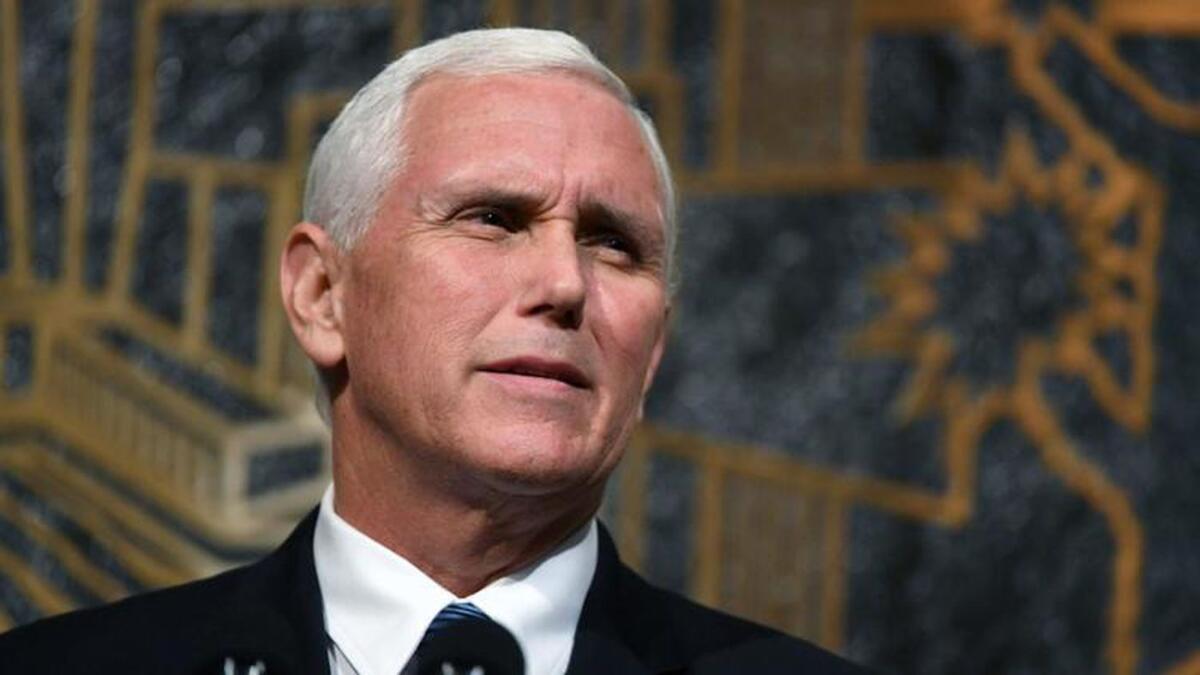
Vice President Mike Pence is delaying his trip to Egypt and Israel for a second time in case he is needed to break a tie in the Senate for the tax bill that is expected to pass narrowly this week.
Two White House officials confirmed the changed schedule, which they say is unrelated to to protests in the region over the administration’s decision to recognize Jerusalem as Israel’s capital.
Pence had initially been scheduled to leave last Saturday. Late last week, the White House moved the trip back a few days to Tuesday night, in case Pence was needed to break a Senate tie. But Monday, they decided to postpone the trip further, to January, given the possibility of a late Senate vote and the coming holidays.
“He wants to see it through the finish line,” said a White House official, referring to the tax measure that is a centerpiece of the Republican legislative agenda. “We don’t want to leave anything to chance.”
The mid-January dates will allow Pence more breathing room to merge schedules with embassies and hotels, the official said. Trump still plans to address the Israeli Knesset, a high-profile venue to discuss the Jerusalem decision where it is most popular.
- Share via
Trump judicial pick who drew ridicule at hearing withdraws
A White House official says the Trump judicial nominee whose qualifications were questioned by a Republican senator has withdrawn his nomination.
Matthew Petersen, who was nominated by President Trump to the U.S. District Court for the District of Columbia, has been the subject of widespread ridicule since he was unable to define basic legal terms during his confirmation hearing Wednesday.
A White House official says Petersen has withdrawn his nomination and that Trump has accepted the withdrawal. The official spoke on condition of anonymity because the official was not authorized to discuss the development publicly.
Louisiana Sen. John Kennedy pressed Petersen, a former chairman of the Federal Election Commission, who testified he had never tried a case, on his qualifications to the bench.
- Share via
Trump says McCain will return to Washington if needed for tax vote
President Trump said Sunday that Sen. John McCain, who is battling an aggressive form of brain cancer, was returning home to Arizona for the holidays but would come back to Washington if needed to cast a vote on the Republicans’ tax overhaul bill.
The Arizona Republican’s office announced last week that McCain was receiving treatment at Walter Reed National Military Medical Center outside Washington for complications from his cancer treatment. McCain’s daughter Meghan tweeted earlier Sunday that her 81-year-old father would be spending Christmas in Arizona.
The Senate is expected to vote early this week on the tax cut legislation, but the GOP appeared to have secured sufficient support without McCain’s vote.
“John will come back if we need his vote,” Trump told reporters as he returned from a weekend at the presidential retreat at Camp David. “He’s going through a very tough time.”
- Share via
Putin calls Trump to thank him for U.S. help foiling terrorist strike
Vladimir Putin phoned President Trump to thank him for what the Russian president said was CIA help in foiling a terrorist attack, the Kremlin said on Sunday.
White House Press Secretary Sarah Huckabee Sanders confirmed the two leaders’ conversation to reporters. It was the second time that the two leaders had talked in four days; Trump called Putin on Thursday to thank the Russian leader for lauding the U.S. economy.
Putin, in his annual year-end news conference, had praised Trump for a strong performance by the U.S. stock market. Perhaps ironically, given his credit to the CIA’s recent help, Putin at that news event dismissed as “hysteria” the consensus among American intelligence agencies that Russia interfered in the 2016 presidential campaign.
In reporting Putin’s call to Trump on Sunday, the official Russian news agency Tass said Putin thanked his American counterpart for “information shared by the US Central Intelligence Agency” that had helped break up a plot to set off explosives in St. Petersburg’s landmark Kazan Cathedral and elsewhere in the city, which is Russia’s second-largest.
Russian authorities last week had credited their country’s counter-intelligence service, the FSB, for foiling the attacks. They reported that seven people affiliated with Islamic State had been detained in St. Petersburg in connection with the plot. The FSB, the successor organization to the KGB, announced Friday that the group had planned to carry out the attacks on Saturday, and that one of those in custody had confessed to the cathedral bomb plot.
- Share via
Mnuchin: Government shutdown unlikely but could happen
Treasury Secretary Steven T. Mnuchin said on Sunday that a government shutdown this week was unlikely but possible.
A two-week stopgap spending bill passed by Congress earlier this month provided enough funding to keep the government running through Friday. A deadlock on another temporary funding measure would open the door to a possible shutdown.
“I can’t rule it out, but I can’t imagine it occurring,” Mnuchin said on “Fox News Sunday,” suggesting everyone had an interest in avoiding the government grinding to a halt and federal workers going unpaid, especially in the holiday season.
“I would expect that both the House and Senate, Republicans and Democrats, understand if they can’t agree on this, they need to have another short-term extension to move this to January,” the Treasury secretary said. “We can’t have a government shutdown in front of Christmas.”
In May, irate over concessions made to Democrats in hammering out a spending measure, President Trump tweeted that a “good ‘shutdown” might help matters. While both parties agree that a government shutdown involves a degree of disruption that is not beneficial to either side, shutdowns in 1995-’96 and in 2013 mainly caused a backlash against Republicans.
The latest funding measure is to be taken up after a vote on a massive GOP tax overhaul, expected by midweek.
- Share via
Trump transition team says sensitive emails should not have been shared with Robert Mueller

President Trump’s transition team is crying foul over how special counsel Robert S. Mueller III obtained emails for his investigation into Russian meddling in last year’s campaign and possible Trump campaign complicity.
Kory Langhofer, a lawyer for the transition team, sent a letter to Congress on Saturday saying there was an “unauthorized disclosure” of emails.
While the Trump transition is long over, the transition team remains a nonprofit organization. Its emails were hosted by the General Services Administration, a federal agency. Mueller reportedly obtained the emails directly from the agency.
“There are attorney-client communications,” Langhofer said in an interview. “There are executive-privileged communications.”
He added, “What we’re asking Congress to do is to take some legislative action to make sure this never happens again.”
Peter Carr, a spokesman for the special counsel’s office, defended the process for obtaining emails.
“When we have obtained emails in the course of our ongoing criminal investigation, we have secured either the account owner’s consent or appropriate criminal process,” he said.
The letter was first reported by Fox News. A request for comment from the General Services Administration was not immediately answered.
This story has been updated with a comment from the special counsel’s office.
- Share via
Virginia house arrest is ending for Paul Manafort
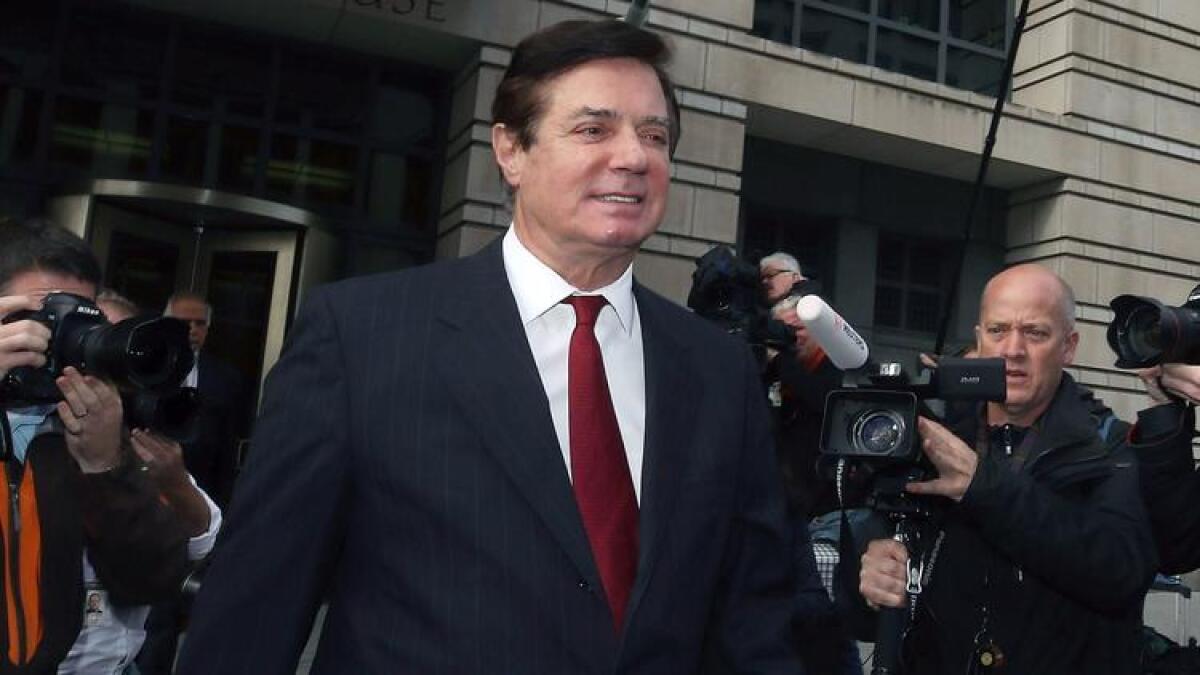
A federal judge agreed Friday to end Paul Manafort’s house arrest in Virginia, allowing President Trump’s former campaign manager to return to Florida while awaiting trial.
The decision followed a dispute between Manafort’s legal team and prosecutors working for special counsel Robert S. Mueller III, who accused Manafort of violating a court order restricting public statements about the case.
Under the terms of the judge’s order, Manafort will be allowed to live at his home in Florida as long as he stays within Palm Beach and Broward counties and obeys a curfew from 11 p.m. to 7 a.m. If he misses a court appearance, he would forfeit four properties valued at $10 million total.
The deal, which includes GPS monitoring, is not as permissive as Manafort originally sought. He had asked to be able to travel freely among Florida, New York, Virginia and Washington.
Manafort faces criminal charges of fraud, conspiracy and money laundering. He has pleaded not guilty.
- Share via
GOP negotiators enhance child tax credit to win over Sen. Rubio
Republican negotiators slightly increased the refundable portion of the expanded child tax credit in their tax plan, raising it to $1,400 in hopes of winning back Sen. Marco Rubio’s (R-Fla.) support ahead of next week’s vote.
Rubio announced Thursday he was withholding support after negotiators ignored his push to make the expanded tax credit, which increases from the current $1,000 to $2,000 in the proposed bill, fully refundable for lower- and moderate-income filers.
The refundable portion in the original bill was $1,100.
The Florida senator argued that was not enough to help working-class Americans, many of whom already view the GOP plan as tilted toward the wealthy.
Rubio’s office was waiting to see the final text before commenting on whether the change was enough to win him over.
“We have not seen the bill text, and until we see if the percentage of the refundable credit is significantly higher, then our position remains the same,” Rubio’s spokeswoman said.
Negotiators meeting Friday before unveiling the bill said they thought they had the support they needed from Rubio and other holdouts.
“I’m confident both chambers will pass it next week,” said Sen. Pat Toomey (R-Pa.).
- Share via
Sen. Marco Rubio opposes GOP tax bill, depriving leaders of crucial support
Sen. Marco Rubio (R-Fla.) says he is currently opposed to the GOP tax plan because it fails to include his proposed enhancements to the child tax credit, leaving leaders without crucial support ahead of next week’s expected vote.
Republicans can only lose two GOP senators from their slim 52-48 majority as they push the plan forward under special budget rules to prevent a Democratic filibuster.
Vice President Mike Pence on Wednesday altered his planned Israel trip so he could be on hand, if needed, to cast a tie-breaking vote.
Rubio, and GOP Sen. Mike Lee of Utah, have fought to increase the child tax credit, doubling it to $2,000 in the GOP plan, but they also want to increase its refundability. They argue it will lower taxes on middle-income families at a time when the tax plan is being criticized as tilted to the wealthy.
“Sen. Rubio has consistently communicated to the Senate tax negotiators that his vote on final passage would depend on whether the refundability of the Child Tax Credit was increased in a meaningful way,” Rubio’s spokeswoman said.
Lee stopped short of opposing the bill, but his spokesman said Wednesday he is undecided.
GOP leaders, though, have said they believe they have the support for passage.
- Share via
White House gives Roy Moore a unsubtle shove: Time to concede

The White House sent a clear signal Thursday to the defeated Republican candidate for Senate in Alabama: It’s time to concede.
Roy Moore refused to concede the race on Tuesday night when Doug Jones, the Democrat, was declared the winner. Election night results show Jones winning by about 1.5 percentage points, three times more than the state’s standard for a recount. Although a few absentee and provisional ballots remain to be counted, there’s no indication they would change the result.
On Wednesday, Moore notably did not call to congratulate Jones — even as President Trump and other leading Republicans did. Instead, he released a video declaring “the battle rages on.”
Asked at the daily news briefing whether the White House thinks Moore should concede today, Press Secretary Sarah Huckabee Sanders said, “It probably sounds like it maybe should have already taken place.”
Sanders also dismissed the idea, pushed by some Moore supporters, that Jones’ victory was tainted in some fashion. Asked if the Democrat had won “fair and square,” she said, “I think the numbers reflect that.”
The state’s Republican senator, Richard Shelby, offered a similar comment in an interview with MSNBC in which he said he was willing to work with Jones. “If I was 25,000 votes behind, it’s not going to change much,” Shelby said.
- Share via
House Speaker Paul Ryan says he’s not leaving anytime soon
House Speaker Paul D. Ryan shot down suggestions Thursday that he might soon be retiring.
Stories often circulate that party leaders, especially the House speaker, are stepping aside. Ryan’s tenure has been as rocky as that of his predecessor, Rep. John Boehner, who abruptly resigned in 2015 amid GOP infighting.
Asked Thursday if he would be leaving, Ryan answered a simple “no,” as he left his weekly press conference in the Capitol.
Ryan, the Wisconsin Republican who reluctantly took over the speaker’s gavel after Boehner’s departure, had just finished talking up the GOP tax plan, which leaders hope to pass next week. He also outlined his sweeping agenda for his longtime goal of entitlement reform of welfare benefits next year.
Two stories published Thursday suggested Ryan may soon be out.
“This is pure speculation,” said spokeswoman AshLee Strong. “As the speaker himself said today, he’s not going anywhere anytime soon.”
- Share via
GOP leaders reach tax deal, cutting corporate rate to 21% and top individual rate to 37%
Republican leaders on Wednesday agreed on a revised plan to cut taxes that would lower the corporate rate from 35% to 21% and drop the top individual rate for the richest Americans to 37%, according to GOP senators and others briefed on the deal.
The tentative accord marked a significant step in the Republican push to have a tax bill on President Trump’s desk by Christmas. Leaders did not release details of the compromise or the text of a final bill as negotiations continued.
“It’s critically important for Congress to quickly pass these historic tax cuts,” Trump said Wednesday, promising that Americans could begin to reap the benefits of the plan as early as February, if passed.
Critics, however, said the latest changes — particularly the lowering of the top individual rate from the current 39.6% — only reaffirmed several independent analyses that show the bulk of the savings from the Republican plan would go to businesses and the wealthy.
- Share via
Farenthold to retire from House amid harassment accusations
Texas Republican Rep. Blake Farenthold won’t seek reelection next year, two Republicans said Thursday, adding his name to the list of lawmakers leaving Congress amid sexual harassment allegations that have cost powerful men their jobs in politics, the arts and other fields.
The accusations against Farenthold surfaced in 2014, when a former aide sued him alleging sexually suggestive comments and behavior and said she’d been fired after she complained. The lawmaker said he engaged in no wrongdoing and the case was settled in 2015.
But the House Ethics Committee said last week that it would investigate Farenthold after congressional sources said he’d paid an $84,000 settlement using taxpayers’ money. Though Farenthold said he’d reimburse the Treasury Department, such payments have drawn public criticism from people saying lawmakers should use their own money for such settlements.
A House official said Farenthold spoke twice Wednesday to House Speaker Paul D. Ryan (R-Wis.), while another official said the congressman spoke once with Rep. Steve Stivers (R-Ohio) who heads the GOP’s House campaign committee. Those discussions suggested that Farenthold may have come under pressure from leaders to step aside. Both officials spoke on condition of anonymity to describe private conversations.
Last week, three lawmakers facing accusations of sexual harassment announced their resignations. Reps. John Conyers (D-Mich.) and Trent Franks (R-Ariz.) have already left Congress while Sen. Al Franken (D-Minn.) has said he will step aside soon.
Mike Bergsma, Republican county chairman in Farenthold’s home county of Nueces, Texas, said Farenthold campaign manager Joseph Walter told him he will not seek reelection. Walter told Bergsma the staff was working on a media statement that would be issued shortly.
“I think it’s a shame. He’s my friend; I think he’s been a good congressman. I wish he had been able to tell his side of the story and that this one issue wasn’t making so much difference,” Bergsma said.
“I don’t think he had done anything that devastating, and the thing that’s really hurting him is that it was public money,” Bergsma said, referring to the use of Treasury money to pay the settlement. “And the way the law is structured, my understanding is, he didn’t have much choice.”
A second Republican who confirmed Farenthold’s retirement spoke on condition of anonymity to describe a decision the lawmaker had not yet made public.
- Share via
Pence postpones Israel trip in case he’s needed to vote on tax cuts
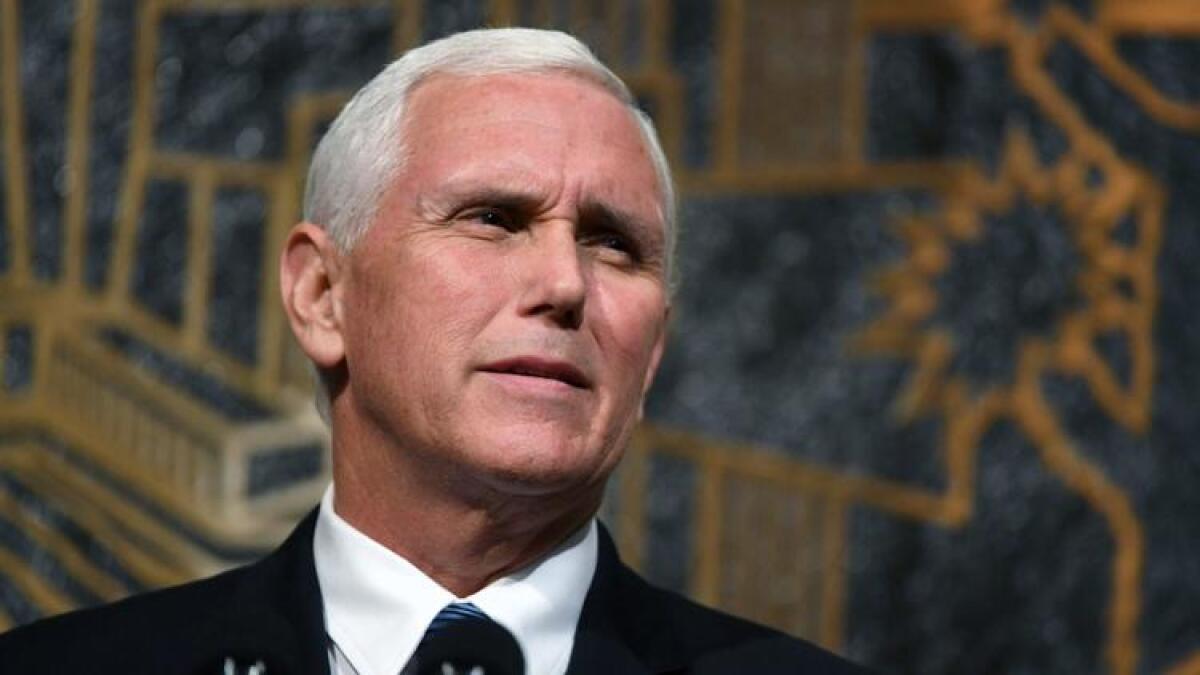
Vice President Mike Pence will postpone his trip to Israel and Egypt next week by a few days in case he is needed to break a tie vote in the U.S. Senate on the Republican tax cut bill, his office announced.
Pence is scheduled to address the Israeli Knesset on the first major U.S. visit to Israel since President Trump declared on Dec. 6 that the United States will recognize Jerusalem as Israel’s capital.
That broke with decades of U.S. policy and international consensus that viewed the holy city’s political status as one that should be in negotiations between Israelis and Palestinians, who both claim the city as their capital.
Trump’s declaration prompted protests by Palestinians and other Arabs. At a summit in Turkey on Wednesday, Arab and Muslim leaders “rejected and condemned” Trump’s decision, and Palestinian Authority President Mahmoud Abbas suggested he might not cooperate with White House efforts to forge an Israeli-Palestinian peace deal.
Pence’s office denied reports in the Israeli press that he had delayed his trip because of the Arab reaction, saying Pence may be needed to break a tie in the Senate on Trump’s most important legislative goal,
Republicans hold a 52-48 majority in the chamber and are trying to vote next week before Democrat Doug Jones, who won a special election in Alabama on Tuesday, is sworn in, which will shrink the majority by one additional vote.
Adding to the uncertainty, Sen. John McCain (R-Ariz.) was hospitalized Wednesday for side effects from his cancer treatment. Sen. Thad Cochran (R-Miss.) also has missed votes this week due to medical reasons.
Alyssa Farah, Pence’s press secretary, said in a statement that Pence would stay in town to preside over a tax vote because “we are so close to passing pro-growth pro-jobs tax reform for hard working families.”
“The vice president will then travel to Egypt and Israel where he’ll reaffirm the United States’ commitment to its allies in the Middle East and to working cooperatively to defeat radicalism,” she said.
- Share via
Roy Moore not conceding; in fact, he sounds like he’s still campaigning
Roy Moore continued to refuse to concede defeat to Democrat Doug Jones in Alabama’s Senate race, issuing a statement urging supporters to “stand against those who would take from us our country.”
In a video statement posted late Wednesday, the former state Supreme Court chief justice declared that “immorality sweeps our land,” and railed against abortion, same-sex marriage and “the right of a man to claim to be a woman, and vice versa.”
“We are indeed in a struggle to preserve our republic, our civilization, and our religion and to set free a suffering humanity. And the battle rages on,” he said. “Today, we no longer recognize the universal truth that God is the author of our life and liberty. Abortion, sodomy and materialism have taken the place of life, liberty and the pursuit of happiness.”
In a speech peppered with quotes from Abraham Lincoln and the Bible, Moore mourned the decline of prayer in schools and complained of the nation’s “huge drug problem,” insecure borders, national debt and the “tyranny” of judges and justices ruling over the Constitution.
“No longer is this about Republican or Democratic control,” he said. “It has truly been said that there is not a dime’s worth of difference between them,” he said. “It is about a Washington establishment which will not listen to the cries of its citizenry - and the battle rages on.”
Late Tuesday night, Jones was nearly 21,000 votes ahead of Moore after votes from 100% of Alabama precincts had been counted. Yet in the video, Moore said the final count did not include military and provisional ballots and his campaign continued to wait for the official vote count from Alabama’s Secretary of State John Merrill.
In an interview with CNN on Tuesday night, Merrill, a Republican, said he would certify the final vote count between Dec. 26 and Jan. 3 and it would be “highly unlikely” that Moore would eventually win.
Moore did not mention the possibility of a recount. A mandatory recount is triggered if the margin between the candidates is narrower than a half percentage point, but Tuesday night’s count had Jones leading by 1.5 percentage points: 49.9% to 48.4%.
- Share via
In Alabama and across the country, pride swells as black female voters show they matter

Every election since she was 16, Catrena Norris Carter has gone door to door, urging black Alabama voters to the polls.
In the months leading up to Tuesday’s U.S. Senate race, the community activist and a band of mostly black women registered college students to vote, waved signs on street corners and egged on fellow African Americans at churches, sororities and even football stadiums to be sure to cast their ballots.
“Hey, we worked our butts off,” said Norris Carter, 49, an organizer with Vote or Die, a get-out-the-vote group that canvassed on Democrat Doug Jones’ behalf in Birmingham, Montgomery and black rural communities. “A win’s been a long time coming.”
The mobilization of African American support is a routine part of just about any winning Democratic campaign. But the overwhelming black turnout here Tuesday, the staggering support for Jones and the sense that African American women in particular carried him to an upset victory made for a moment of shining pride.
Not just here in Alabama, but across the country.
The fact that the loser was Roy Moore, a Republican with a long history of racially provocative actions and statements, and that the triumph was eked out in a state with a long, ugly history of racial oppression made victory all the sweeter.
- Share via
Politics has veered from one side to the other, but Doug Jones’ win in Alabama suggests the need to hew to the center
The Democratic win Tuesday in Alabama’s U.S. Senate race may have seemed the most striking example yet of the bitterly negative tenor of American politics in the last several decades, as it has veered from one political pole to the other like a frenetic metronome.
Doug Jones’ victory over Republican Roy Moore by little more than 1 percentage point followed by only a year Donald Trump’s 28-point victory in the same state. The two men had almost nothing in common other than their shared good luck in running against a widely disliked member of the opposing party.
Trump’s victory in Alabama and similar states was in great part driven by animosity toward Democrat Hillary Clinton. Jones’ success rested on Democratic anger at Trump, reinforced by opposition to the controversial Republican candidate, Moore. The metronome needle that flew far to the right in 2016 swung back to the left in 2017.
- Share via
Omarosa Manigault Newman is leaving the Trump administration. Did she help woo black support?
She is among President Trump’s most high-profile black supporters, a reality television star turned government official.
Now, Omarosa Manigault Newman is set to leave her role as director of communications in the White House Office of Public Liaison, a position in which she was tasked with working on outreach to various constituency groups.
On Wednesday, White House Press Secretary Sarah Huckabee Sanders said in a statement that Manigault Newman was resigning to pursue other opportunities effective Jan. 20, one year to the date after Trump’s inauguration.
- Share via
Embattled Trump judicial nominee Brett Talley withdraws
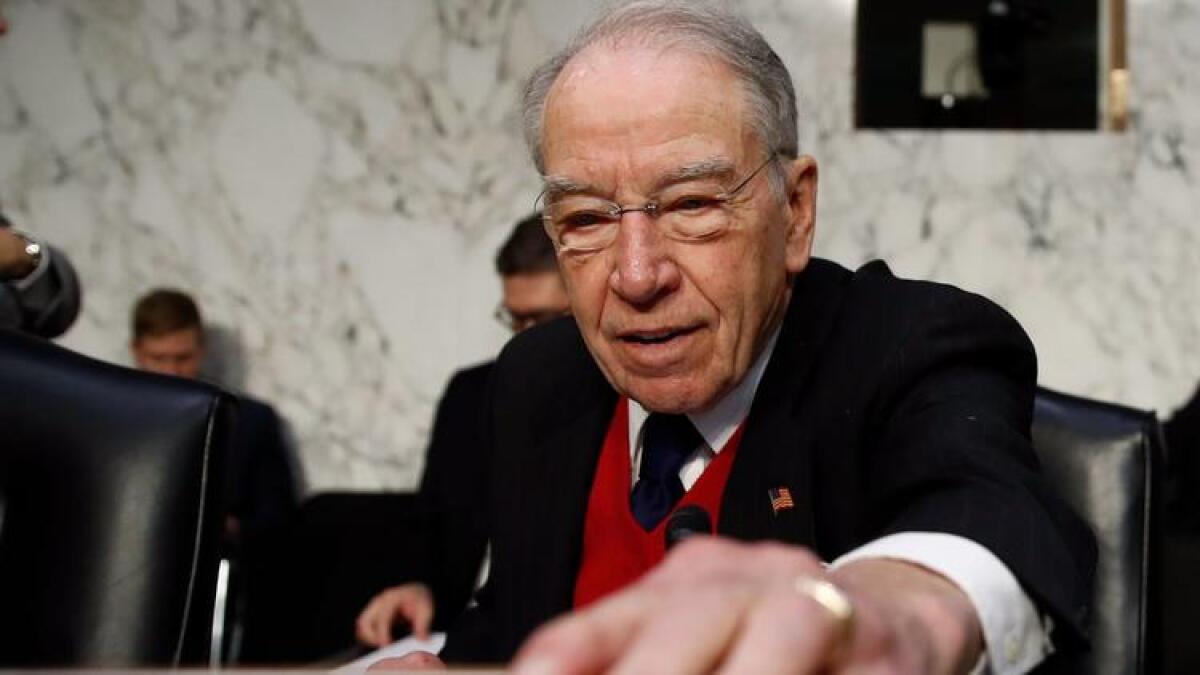
Brett J. Talley, President Trump’s choice to be a federal judge in Alabama, has withdrawn from consideration, a White House official said Wednesday.
He is the first failed judicial nominee for the new administration, but he is likely to be joined shortly by Jeff Mateer, a Texas assistant attorney general who was nominated to be a district judge in his state.
Senate Judiciary Committee Chairman Charles E. Grassley (R-Iowa) has moved quickly to approve Trump’s proposed judges, but he said Monday that he would not hold a hearing for Mateer and would oppose confirming Talley in the full Senate.
Talley is a 36-year old lawyer and blogger who had close ties to the White House. His wife, Ann Donaldson, works for White House counsel Don McGahn. But Talley has little legal experience, has never tried a case and was rated “not qualified” by the American Bar Assn.’s screening committee.
- Share via
Rod Rosenstein pushes back on Republican criticism of special counsel investigation

Deputy Atty. Gen. Rod Rosenstein, who oversees special counsel Robert S. Mueller III and his investigation into Russian meddling into last year’s presidential campaign, said Wednesday the case has been handled “appropriately.”
Rosenstein’s defense of Mueller came during a House Judiciary Committee hearing as Republicans try to portray the special counsel as tainted by partisan bias against President Trump.
“He was an ideal choice,” Rosenstein said about Mueller, whom he appointed in May.
Democrats have repeatedly warned that Trump could order Rosenstein to fire Mueller. White House lawyer Ty Cobb said in a Tuesday interview that there was no talk of trying to remove the special counsel.
“There are no plans, as we’ve said for months on end, to fire Mr. Mueller,” he said.
- Share via
The guru behind Doug Jones’ big win holds forth on Alabama, Trump and the Democrats’ future
Paul Maslin is a veteran Democratic pollster who spent Wednesday traveling home from Alabama and luxuriating in Doug Jones’ upset victory in the state’s special U.S. Senate race.
During a layover at Chicago’s O’Hare airport, he took a victory lap and offered a few thoughts between flights.
On President Trump: “If he can’t figure out a way to turn this around, we’re going to win the Senate, we’re going to kill ’em in the House and we’re going to set up the second half of his presidency where he’s going to be neutered.”
On Democrats going forward: “The lesson is we need to keep being aggressive, fighting him everywhere. There’s no reason we can’t win Tennessee, there’s no reason we can’t win Arizona and Nevada. There’s no reason we can’t win congressional seats all over the place.”
That said, Maslin suggested Democrats have to deliver if they win the House in 2018 and look to taking back the White House in 2020.
On the challenge ahead: “We’re going to have the onus on us, which means we can’t simply be naysayers. We’ve lost credibility in the Midwest, in places like Pennsylvania. The Democratic Party is seen as being out of touch, elitist, without any good ideas on economic or pocketbook issues. We’re going to have to give people a sense we’ve turned the page and we’re not the same old, same old.”
On the bottom line:
“Rallying people against this president, this Congress and the people who are in control of the government remains a tremendous advantage and will continue to be for the next year.”
- Share via
Republican leaders still hammering out differences on tax bill, with final votes expected next week
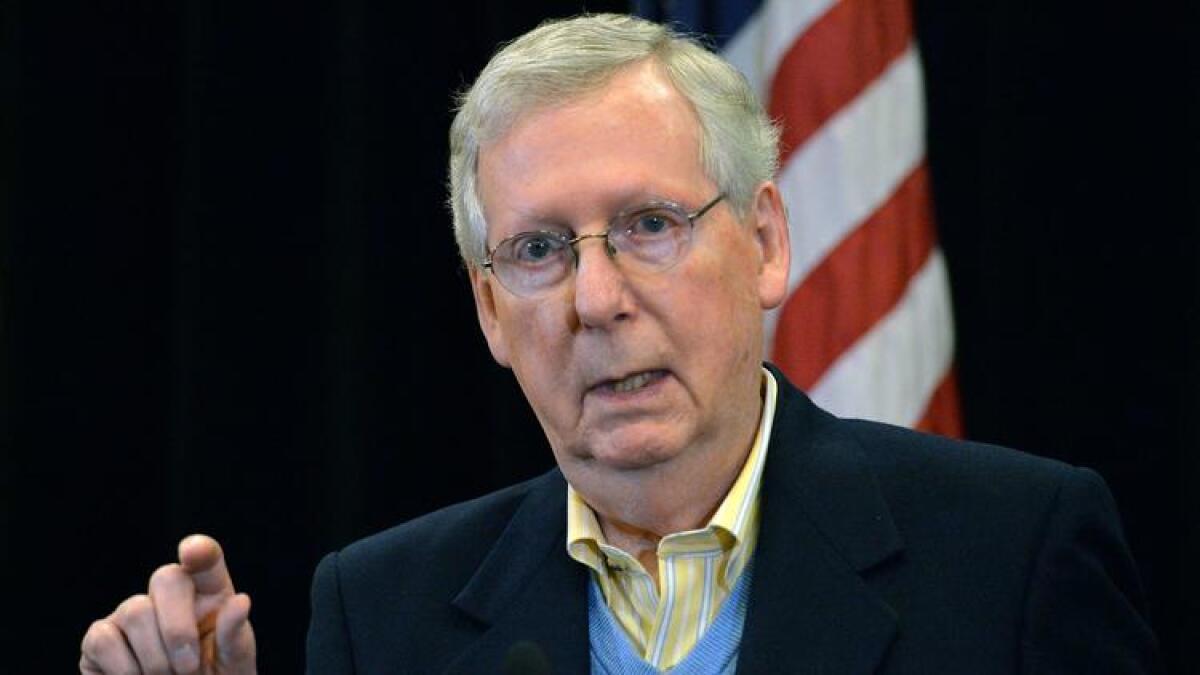
Ahead of a pivotal meeting Wednesday, House and Senate negotiators swapped new offers on the GOP tax bill as they hurry to resolve differences and regain momentum for passage of President Trump’s top priority.
The focal point of the $1.5-trillion tax plan — the steep reduction in corporate rates from 35% to 20% — is expected to be relaxed slightly in the final deal, perhaps to 21%, as negotiators scramble to generate revenue that can be used to offset tax breaks elsewhere.
Trump indicated he would be open to higher corporate rates than Republicans first agreed to under a GOP framework, and House Ways and Means Committee Chairman Kevin Brady (R-Texas) said Tuesday that lawmakers also were willing to shift. But others said the reported 21% corporate rate was not yet set.
“We’re still talking,” said the majority whip in the Senate, John Cornyn of Texas, late Tuesday.
- Share via
Omarosa Manigault Newman leaving White House
The White House says Omarosa Manigault Newman — one of President Trump’s most prominent African American supporters — plans to leave the administration next month.
White House press secretary Sarah Huckabee Sanders says Manigault Newman’s resignation is effective Jan. 20, one year since Trump’s inauguration.
Manigault Newman’s decision comes at the start of what’s expected to be a round of departures heading into the new year.
The White House said last week that deputy national security advisor Dina Powell will leave the administration early next year.
Manigault Newman is a former contestant on Trump’s reality TV show “The Apprentice.” She joined the administration as director of communications for the White House Office of Public Liaison, working on outreach to various constituency groups.
- Share via
In stunning 2017 defeats, Republicans see vision of difficulties in 2018
Democrats who opened the year clashing among themselves and lamenting President Trump’s election have closed 2017 with victories that demonstrated their ability to weaponize party enthusiasm and draw a template for success in a sharply competitive battle for Congress in 2018.
For Republicans, Tuesday night’s stunning loss by Roy Moore in Alabama’s Senate race — the first GOP loss in a Senate race there in a generation — underscored a bleak passage of time: A year that began in unified control of Washington has ended with the party bitterly split and redefined in the worst of ways, saddled with an unpopular president and a Senate candidate accused of child molestation.
Certainly, Doug Jones’ victory in Alabama was to some extent a fluke — an outcome made possible by Republicans’ nominating a deeply flawed candidate, Moore, who many of the party’s voters could not stomach. Turnout was tepid in key Republican areas, reflecting conservative voters who chose to sit this one out.
- Share via
Watch live: Rod Rosenstein testifies before House Judiciary Committee
Ever since Atty. Gen. Jeff Sessions recused himself from the Russia investigation in March, no Justice Department official has been more important to the case than Rod Rosenstein.
As the deputy attorney general, the No. 2 position at Justice, Rosenstein appointed former FBI Director Robert S. Mueller III as special counsel and he has the sole authority to fire him.
The role has placed Rosenstein under immense political pressure, and on Wednesday he’ll face questions from the House Judiciary Committee at a time when Republicans are raising doubts about Mueller’s investigation.
The hearing is scheduled to begin at 7 a.m.
- Share via
Democrat Doug Jones wins Alabama Senate seat, but Roy Moore won’t concede
Democrat Doug Jones, who started the Alabama race for U.S. Senate as a massive underdog, swept to victory Tuesday night in a repudiation of scandal-stained Roy Moore. The upset also dealt a serious blow to President Trump.
The narrow victory slices the GOP’s already-thin margin in the Senate to a single seat, complicating the party’s legislative push and giving Democrats a major boost heading into the 2018 campaign, when control of Congress will be at stake.
The win — which Moore refused to acknowledge — marked the first time a Democrat has captured a U.S. Senate seat in Alabama in a quarter of a century.
More broadly, it signaled the limits of the nation’s political tribalism.
- Share via
Trump, after endorsing two losers in Alabama: ‘I was right’
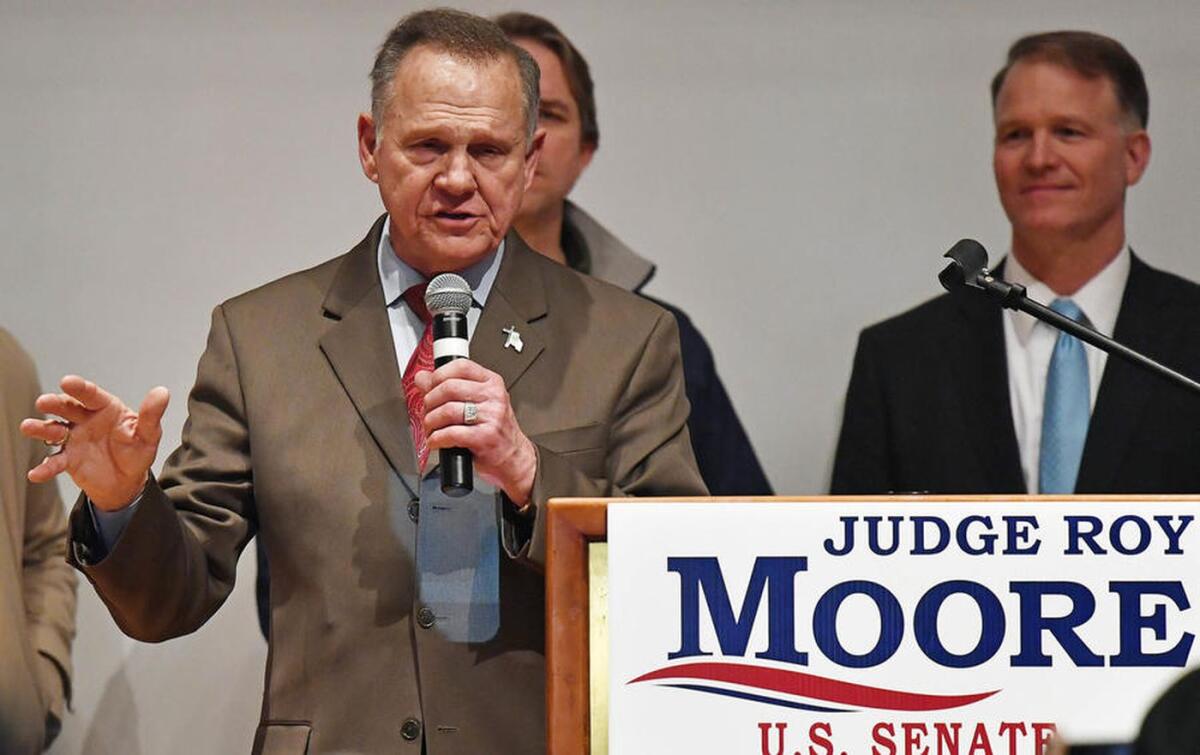
President Trump, who stuck with Alabama Senate candidate Roy Moore despite warnings from fellow Republicans that Moore was sullying their party, defended his decision after Democrat Doug Jones’ historic win on Tuesday.
“I was right!” Trump tweeted early Wednesday, alluding to his earlier endorsement of Luther Strange, the incumbent Republican senator whom Moore upset in a party primary. Moore, who faced allegations of preying on young girls decades ago, had “the deck stacked against him!” Trump wrote.
Trump said he nonetheless worked hard for the candidate, but that Moore’s loss justified his initial endorsement of Strange.
“The reason I originally endorsed Luther Strange (and his numbers went up mightily), is that I said Roy Moore will not be able to win the General Election,” Trump wrote. “I was right!”
The Alabama outcome is likely to hurt Trump politically. Not only did two candidates he endorsed suffer losses — Strange’s support in polls was little changed by Trump’s backing -- but the already slim Republican margin in the U.S. Senate is cut to 51-49. And Republicans who remain will have less confidence that Trump’s political brand will help them with voters.
- Share via
Net neutrality’s repeal means fast lanes could be coming to the internet. Is that a good thing?
With federal regulators poised to repeal net neutrality rules this week, your internet service provider would be allowed to speed up delivery of some online content to your home or phone.
Whether those fast lanes are coming, and what they ultimately deliver for Americans, is unclear.
The concept, known as paid prioritization, involves a telecommunications company charging an additional fee to transport a video stream or other content at a higher speed through its network.
- Share via
Alabama GOP chief says Moore lost election

The leader of the Alabama Republican Party recognized Democrat Doug Jones as the winner of Tuesday’s U.S. Senate election even as GOP candidate Roy Moore refused to concede defeat.
State GOP chairwoman Terry Lathan said party leaders were “deeply disappointed” in the close result.
“During this campaign, we heard Mr. Jones repeatedly say he would talk about ‘kitchen table issues’ and that he would ‘reach across the aisle’ to work with Republicans,” she said.
“While these issues weren’t discussed and no other Democratic senator has worked with the Republicans, all eyes will be on his votes. Alabamians will watch the issues he will support or try to stop. We will hold him accountable for his votes.”
If Jones aligns himself with liberal Democrats in Washington, she said, Alabama voters will remember his choices when he is up for reelection in 2020.
- Share via
Roy Moore declines to concede in Alabama Senate race
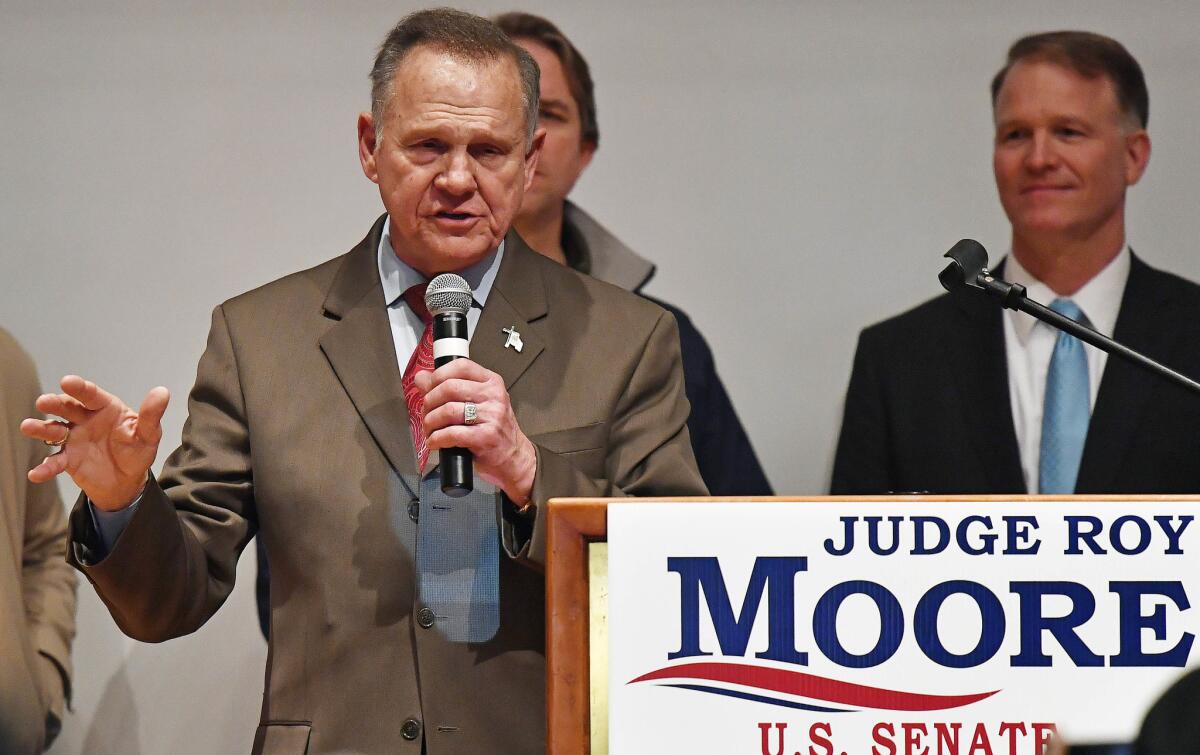
Roy Moore declined to concede defeat Tuesday night in the Alabama Senate election even after Democrat Doug Jones declared victory.
“It’s not over, and it’s going to take some time,” Moore said, citing the narrow margin between him and Doug Jones in the preliminary count.
Appearing downcast at his election night party in Montgomery, Moore quoted Scripture and bemoaned attacks during the campaign.
“Part of the problem with this campaign is we’ve been painted in an unfavorable and unfaithful light,” he said. “We’ve been put in a hole, if you will.”
Alabama Secretary of State John Merrill, a Republican, told CNN that he would certify the final vote count between Dec. 26 and Jan. 3.
With votes from 100% of Alabama’s election precincts counted late Tuesday night, Jones was nearly 21,000 votes ahead of Moore.
“There’s always a chance of a recount because any candidate can ask for a recount, and if they pay for it, they can receive a recount,” Merrill said.
A mandatory recount is triggered if the margin between the candidates is narrower than a half percentage point, he said. But the count Tuesday night had Jones leading by 1.5 percentage points: 49.9% to 48.4%.
Military ballots and provisional ballots will be counted over the next week, Merrill said, and write-in ballots must be reviewed to make sure the candidates were qualified to be tallied.
Moore campaign officials said a review of write-in ballots could narrow the margin enough to trigger a mandatory recount.
- Share via
Trump’s troubles with Congress just got worse: Five takeaways from Democrats’ upset in Alabama
The stunning victory of Democrat Doug Jones over Roy Moore in Alabama’s U.S. Senate election on Tuesday marked an enormous setback for Republicans in a state they have dominated for decades.
It’s a setback with a silver lining, to be sure.
Here are five big takeaways from the Democrats’ capture of the Senate seat vacated by Republican Atty. Gen. Jeff Sessions:
- Share via
Trump bemoans write-ins as he congratulates Democrat Doug Jones
- Share via
Trump suffers big setback in Alabama, but congratulates Democrat Doug Jones
- Share via
Meet Doug Jones, the law-and-order man who has won Alabama’s Senate seat
The odds of any Democrat capturing a U.S. Senate seat in Alabama are steep at best, but Doug Jones was uniquely suited to pull off an upset Tuesday over Republican Roy Moore.
Accusations that Moore sexually abused teenage girls played a big part, no doubt, in Jones’ improbable victory over the renowned religious right crusader.
Jones, 63, is a former U.S. attorney who cast himself as a law-and-order man. He is skilled at muting his liberal stands on such issues as abortion and gay rights — a necessity in one of the South’s most conservative states.
- Share via
Doug Jones lauds ‘common courtesy and decency’ in Alabama vote
At the end of the day, this entire race has been about dignity and respect. This campaign has been about the rule of law. This campaign has been about common courtesy and decency.
— Democrat Doug Jones of Alabama, in victory speech
- Share via
Democrat Doug Jones wins Alabama Senate race in stunning victory
Democrat Doug Jones, whose uphill bid for U.S. Senate gathered strength when Republican Roy Moore was hit with charges of sexual misconduct with teenage girls, won Alabama’s special election Tuesday.
The victory by Jones, a former prosecutor, sliced the GOP’s already thin Senate majority to a bare 51-49.
He will replace interim Republican Sen. Luther Strange, who was appointed in February to fill the seat vacated by Atty. Gen. Jeff Sessions.
- Share via
Private texts show FBI officials exchanged insults about Trump last year
Two FBI agents involved in the Russia investigation exchanged a series of insults about Donald Trump in private texts during the campaign last year, calling him an “idiot” and “awful,” according to documents released to Congress by the Justice Department on Tuesday night.
Special counsel Robert S. Mueller III removed one of the agents, Peter Strzok, from the investigation into possible collusion between the Trump campaign and Russia, as soon as the texts surfaced in July during an inspector general investigation. Strzok also was involved in the FBI investigation into Hillary Clinton’s emails that concluded last year.
In a March 2016 exchange of texts with FBI lawyer Lisa Page, Strzok wrote: “Omg he’s an idiot,” according to messages obtained by the Los Angeles Times.
“He’s awful,” Page replied.
“America will get what the voting public deserves,” Strzok said.
“That’s what I’m afraid of,” Page replied.
The texts were sent to several congressional committees late Tuesday, including the House Judiciary Committee. Deputy Atty. Gen. Rod Rosenstein is scheduled to testify before the committee Wednesday morning and is likely to face questions about them.
Republicans in Congress have been pressing the Justice Department to release the agents’ texts, saying they suspect bias in the FBI’s inquiries on Clinton and Russia interference.
The pair apparently were exchanging texts during a Republican presidential debate in March 2016. “Also did you hear [Trump] make a comment about the size of his d--- earlier? This man can not be president,” Page wrote.
After Page remarked that she had seen a Bernie Sanders bumper sticker, Strzok said: “He’s an idiot like Trump. Figure they cancel each other out.”
About a week after the election, they expressed horror at reports that then-Sen. Jeff Sessions was a leading candidate for the job of attorney general.
“Which is the f-ed uppedness of it....Sessions for AG,” Strzok wrote.
“Good god,” Page wrote back.
- Share via
Alabama voices: Keeping fingers crossed ‘that what he says is true’
- Share via
White House interviews finished in special counsel investigation, Trump lawyer says
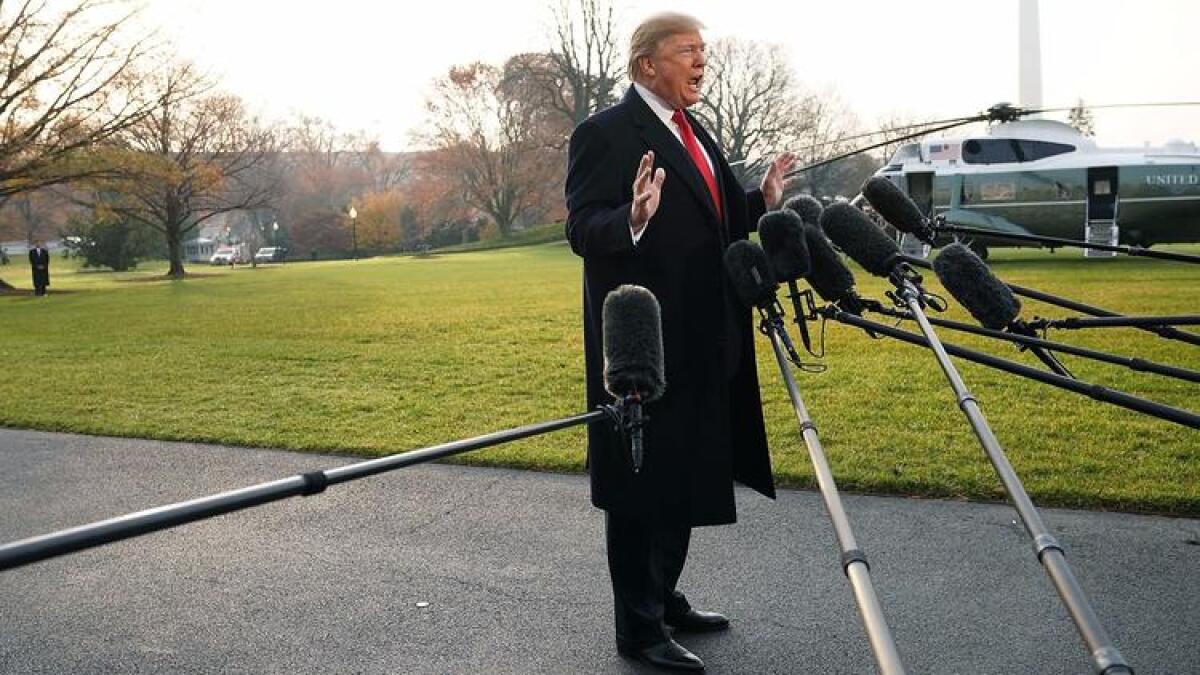
Investigators working for special counsel Robert S. Mueller III have finished interviewing White House officials, according to Ty Cobb, an attorney on President Trump’s legal team.
“All the White House interviews are over,” Cobb said in an interview on Tuesday, adding that the Trump camp hopes the special counsel’s office brings its probe to “a prompt and appropriate conclusion.”
A spokesman for the special counsel’s office declined to comment. Mueller was appointed earlier this year to examine whether anyone from Trump’s team coordinated with Russia’s interference in last year’s campaign.
Cobb represents the White House and helped arrange interviews with the special counsel’s team. He declined to say when the last one took place or which administration officials were questioned.
His insistence that the investigation could wrap up soon has prompted criticism in the past. Rep. Adam Schiff of Burbank, the top Democrat on the House Intelligence Committee, previously called the idea “complete fiction.”
“I can see why that would be political wishful thinking on the part of the White House, but I don’t see how it would be possible,” he said.
- Share via
Republican senators torn over whether Roy Moore, if elected, would be invited to caucus
Republican senators appeared torn over whether Alabama’s Roy Moore would be invited to join the GOP caucus in the Senate if he is elected in Tuesday’s special election.
Senate Majority Leader Mitch McConnell (R-Ky.) declined to say whether Moore, who has the support of President Trump but whose candidacy has divided Republicans, would be invited for the almost daily lunches and strategy sessions.
“All of those are good questions for tomorrow and we await the outcome,” McConnell told reporters.
GOP leaders appear increasingly resigned that they cannot block Moore from being seated in the Senate if he defeats Democrat Doug Jones in the special election for the open seat. McConnell recently cited a 1969 Supreme Court ruling as leaving no option but to swear in the candidate, though he said the Senate would likely launch an Ethics Committee investigation into allegations against Moore of sexual misconduct.
“After that, it’s anybody’s guess,” said Sen. John Thune of South Dakota, the third-ranking Republican.
That doesn’t mean fellow GOP senators, though, would welcome Moore into their conference.
”Let’s see what the outcome is and then deal with the outcome,” said Sen. Bob Corker (R-Tenn.), a Moore critic. ”I’ve been pretty outspoken.”
Sen. Jerry Moran (R-Kan.) downplayed the importance of the conference meetings, saying he rarely joins for lunch. But pressed on whether Moore should be invited, he said, “I’ve indicated my thoughts about Mr. Moore and my desire that he not seek election.”
And Sen. John Kennedy (R-La.), who said he understood the anger Moore’s supporters feel at the establishment in Washington, nevertheless indicated he was uncertain whether the Alabamian would join the GOP conference if elected.
“I don’t know how to answer that question,” he said.
- Share via
Steve Bannon misfires, mocks University of Alabama. Oops

Stephen K. Bannon made millions of dollars as a Hollywood producer and Wall Street banker, but casts himself as a guardian of blue-collar America now that he leads the right-wing Breitbart News.
That’s no easy balancing act, and Bannon stumbled badly at the closing rally of Republican Roy Moore’s Senate campaign in Alabama.
Bannon, former chief strategist for President Trump, told Moore supporters Monday night that MSNBC anchor Joe Scarborough had “called me a Yankee the other day, just because I’m from Richmond, Virginia, the capital of the Confederacy.”
“That’s right, Joe, I got into some Yankee schools, Georgetown and Harvard, that I don’t think you made the cut on, brother. Just because a Southerner went to a Yankee school, Joe, doesn’t make you a Yankee.”
Oops.
It turns out that Scarborough, like Moore, is a graduate of the University of Alabama, deeply beloved by many Moore supporters.
The “Morning Joe” host, a Georgia native, had a field day on Twitter as he mocked Bannon, a former Goldman Sachs executive who lived for years in Santa Monica, that liberal enclave of the coastal elite.
- Share via
Female lawmakers call for investigation into Trump sexual misconduct allegations
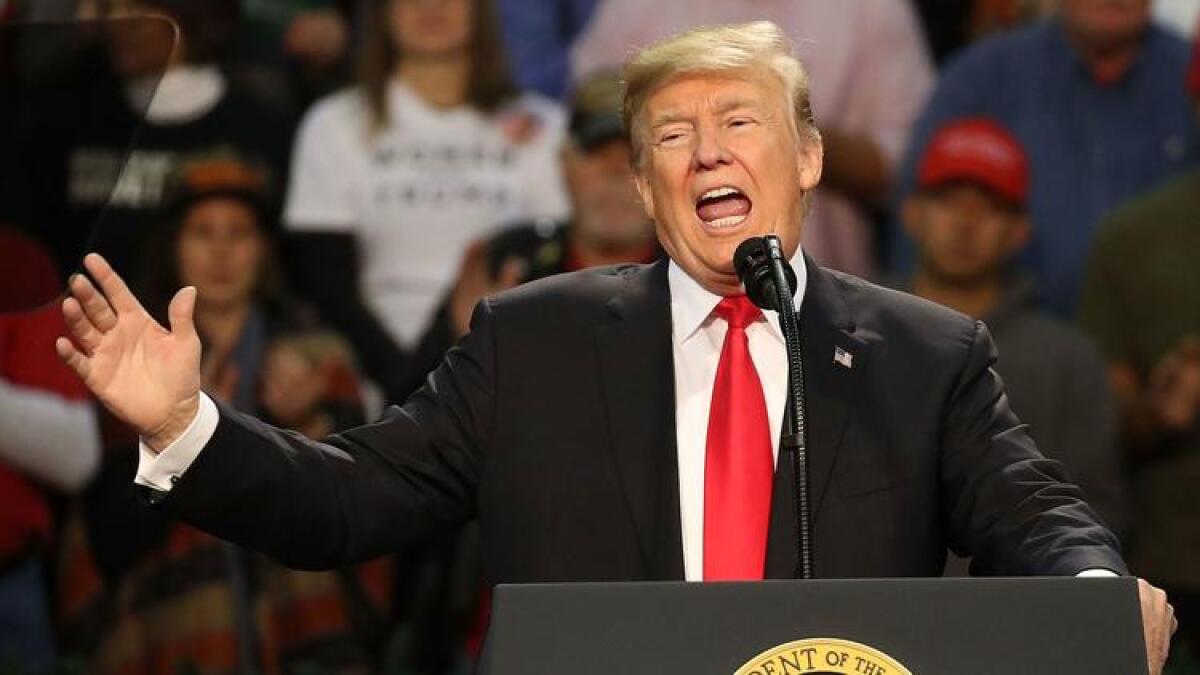
A group of House Democrats on Tuesday called for an investigation into allegations of sexual misconduct by President Trump.
“The #MeToo movement has arrived and sexual abuse will not be tolerated, whether it’s by a Hollywood producer, the chef of a restaurant, a member of Congress or the president of the United States,” Rep. Lois Frankel of Florida said at a news conference. “No man or woman is above the law.”
Frankel and other members of the Democratic Women’s Working Group want the House Committee on Oversight and Government Reform to investigate claims by more than a dozen women of inappropriate behavior by Trump before he was elected. Three of the accusers on Monday asked for a congressional investigation.
A wave of allegations have been leveled against powerful men in multiple private industries and on Capitol Hill in the weeks since allegations were first made against movie producer Harvey Weinstein.
“I’m sorry, Mr. President, you do not live under a different set of rules,” said Rep. Brenda Lawrence of Michigan.
The White House has dismissed the validity of the claims, with Trump tweeting Tuesday morning that Democrats unable to prove his campaign colluded with Russia are now focused on “false accusations and fabricated stories of women who I don’t know and/or have never met.”
The letter, which had the signatures of 59 female House members when it became public, now has more than 100 signers because male Democrats signed on, Frankel said.
Such an investigation of a Republican president by a Congress controlled by his own party is unlikely.
Rep. Elijah Cummings of Maryland, the ranking Democrat on the committee, voiced his support for an investigation.
Committee Chairman Trey Gowdy (R-S.C.) responded in a letter Tuesday afternoon saying that the allegations cited by the Democrats “constitute crimes” and he is forwarding their letter to the Justice Department.
“This committee, nor any other committee of Congress, does not, and cannot, prosecute crimes,” he said in the letter. “Those alleging sexual assault or criminal sexual conduct deserve to be interviewed by law enforcement professionals, and charging decisions should be made by prosecutors based on the quantum and quality of the admissible and provable evidence.”
3:15 p.m.: This post has been updated with response from Committee Chairman Trey Gowdy (R-S.C.).
- Share via
When Trump tweets, Putin is briefed

Russian President Vladimir Putin doesn’t have a Twitter account, but that doesn’t mean he’s not following every tweet posted by @realDonaldTrump.
In fact, Trump’s tweets are presented to Putin every day in his daily briefings and considered White House statements, according to Kremlin spokesman Dmitry Peskov.
“Moscow considers all statements made on his [Trump’s] official Twitter account to be official, so reports are presented to President Putin about them, as well as about official statements that politicians make in other countries,” Peskov said Tuesday in his daily phone call with the press.
Peskov declined to comment about criticism of Trump’s tweeting habits, saying “it would be wrong” to do so.
Putin has said he does not have time for social media accounts. The Kremlin press department manages the president’s Instagram account but does not intend to open a Twitter account for Putin, Peskov said.
Even if Putin doesn’t tweet, Russia’s political elite frequently use social media to express Kremlin views.
Alexey Pushkov, a senator in Russia’s parliament, Tuesday fired off a series of tweets taking issue with everything from what he called U.S. Russophobia to the World Anti-Doping Agency. In one tweet he suggested Nikki Haley, the U.S. ambassador to the United Nations, was trying to boost her career post-Trump by saying the women who have accused the U.S. president of sexual misconduct should be heard.
“The Trump administration is falling apart: Haley calls to listen to those who accuse him of sexual harassment. Preserving her own career after Trump,” Pushkov tweeted.
- Share via
Amid the rush to finish GOP tax bill, a sudden slowdown for second thoughts
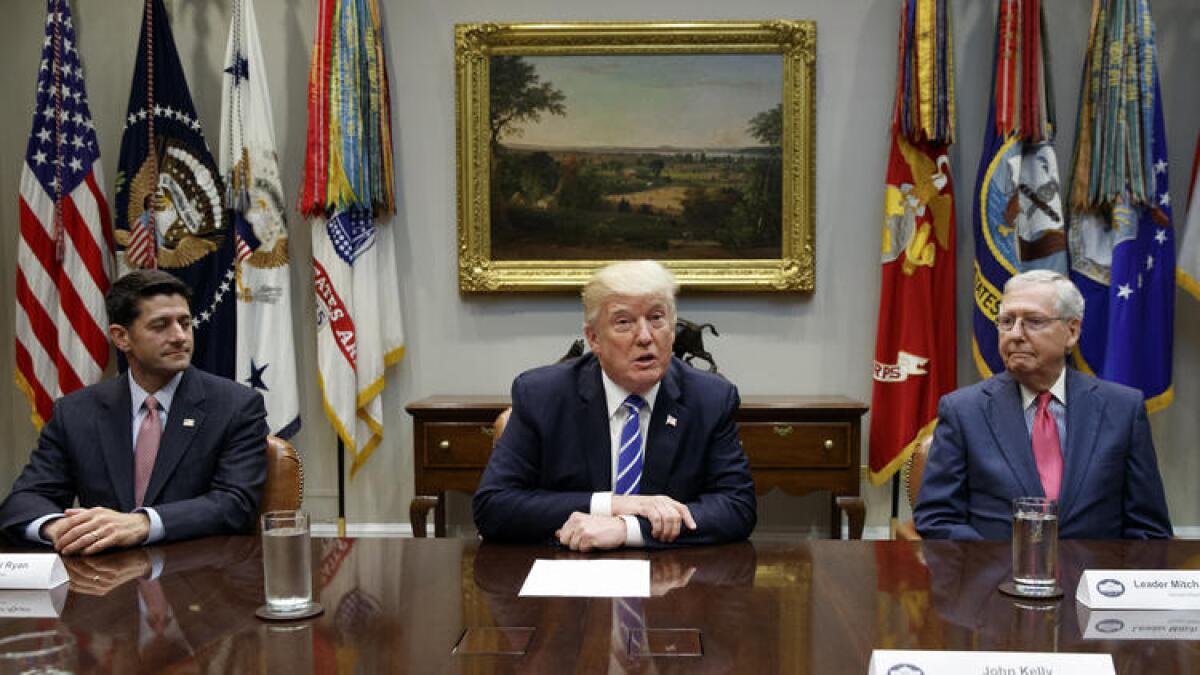
The rush to finish the GOP tax overhaul has hit a snag as Republicans grapple with substantial differences between the House and Senate bills, and pause to consider unintended consequences of the most massive rewrite of the tax code in a generation.
Lawmakers are eager to pass the bill, President Trump’s top domestic priority, by Christmas. But they are also increasingly wary of political fallout from the hurried process and want to prevent embarrassing moments, such as the scribbled text hastily added to the margin of the final Senate bill.
The end of any major legislative undertaking is often a sprint. But the final stretch of the GOP tax plan is being complicated by an accelerated process like none other in recent history.
- Share via
President Trump slaps back at critic Sen. Kirsten Gillibrand with suggestive tweet
President Trump wrote a sexually suggestive tweet on Tuesday about New York Senator Kirsten Gillibrand, after the Democratic lawmaker called for him to resign over sexual misconduct allegations.
Trump wrote that “Lightweight” Gillibrand “would come to my office ‘begging’ for campaign contributions not so long ago (and would do anything for them).”
Trump’s tweet was unusually provocative for a sitting U.S. president, and politically risky given national attention to the topic of sexual harassment of women as well as renewed attention to the allegations against him by more than a dozen women complaining of his past misconduct. Social media and cable television talk shows quickly ignited with bipartisan outrage.
Trump also called Gillibrand a “total flunky for” Senate Minority Leader Charles E. Schumer, her fellow Democratic senator from New York. He also referred to Gillibrand’s statement earlier this month that Democratic President Bill Clinton should have resigned from office, calling Gillibrand “very disloyal.”
Gillibrand hit back at Trump, saying he’s brought “shame” to the Oval Office and telling the president he “cannot silence” her.
- Share via
Alabama Senate race churns into final hours, still too close to predict
With the help of two high-profile surrogates, Roy Moore and Doug Jones scrambled Monday to stake their final claims in Alabama’s cliffhanger of a U.S. Senate race.
Moore, who largely disappeared from public view after being accused of sexual misconduct, resurfaced for an election eve rally with Stephen K. Bannon, a political advisor to President Trump, in the rural southeast corner of the state.
“We’re Alabama. We’re Republican. And we’re not going to stand by and let other people from out of state and money from California control this election,” he told cheering supporters in Midland City.
Jones stumped in Birmingham and Montgomery, targeting core Democrats but also inviting Republicans to follow the lead of the state’s senior GOP senator, Richard C. Shelby, who snubbed Moore by writing in another candidate.
“The people of the state, they have elected Richard Shelby for four decades,” Jones said at a breakfast stop in Birmingham. “They’re going to listen to Richard Shelby.”
- Share via
Jamie McCourt is sworn in as U.S. ambassador to France

Former Los Angeles Dodgers co-owner and Trump fundraiser Jamie McCourt was sworn in as the U.S. ambassador to France and Monaco at the White House on Monday, a White House official said.
The swearing-in took place inside the Oval Office, said deputy press secretary Lindsay Walters. No reporters were allowed to attend the ceremony. Walters said President Trump was present, and Vice President Mike Pence administered the oath to McCourt.
McCourt, a lawyer and entrepreneur, was one of Trump’s early supporters. She signed a letter in October 2016 with 100 other business executives praising Trump’s economic plans and was listed as a 2016 State Victory Finance Chair for Trump’s campaign in California.
Like every president, Trump has named several past campaign donors to be ambassadors. The Paris posting historically has been among the most coveted. McCourt donated more than $400,000 to the Trump Victory fund, $50,800 to the Trump inauguration and more than $170,000 to the Republican National Committee.
McCourt’s divorce from Frank McCourt was closely followed by Dodger fans. The couple reached a settlement in 2011 with Jamie McCourt reportedly receiving about $130 million and relinquishing her claim to the team.
Update: This post was updated to identify the White House spokesperson, who initially declined to be named, and include additional details about the ceremony.
- Share via
‘We must talk about the health aspects’ of climate change, Schwarzenegger says

He showed up at Paris City Hall on Monday on a green bicycle and wearing a green tie to talk climate change with the mayor.
But Arnold Schwarzenegger almost didn’t make the trip from Los Angeles. One of the wildfires scorching Southern California was threatening his home.
“Luckily we have extraordinary firefighters,” he told a group of officials and journalists.
The actor and former governor of California was speaking in Paris as the founder of R20, a nonprofit based in Geneva that aims to help regional, state and local governments reduce their carbon emissions by developing clean energy sources. He met with the mayor, Anne Hidalgo.
The French, like much of the world, were dismayed when President Trump announced in June that the United States would withdraw from the Paris climate change accord signed last year to slow emissions and limit global warming. Schwarzenegger did his best to reassure them.
“It doesn’t matter that Donald Trump backed out of the Paris agreement, because the private sector didn’t drop out, the public sector didn’t drop out, the universities didn’t drop out, the scientists didn’t drop out, the engineers didn’t drop out.… No one else dropped out,” he said.
“Donald Trump pulled Donald Trump out of the Paris agreement, so don’t worry about that,” he said. “We at a sub-national level are going to pick up the slack and continue on. We will fight and we will create the kind of future for our children and grandchildren because that is our responsibility and no one will stop us.”
In October, a dozen cities, including Los Angeles and Paris, pledged to dramatically reduce the use of gasoline- and diesel-powered vehicles by 2030 — a plan that Schwarzenegger said was meant to “inspire the rest of the world.”
He also encouraged people to talk about climate change in terms of air pollution and the toxic fumes that accompany carbon dioxide in exhaust from cars and factories.
“We must talk about the health aspects,” he said. “This is what people can relate to. People want to survive. That is the way the human brain is wired. If you say that eventually our glaciers are melting, the iceberg is melting, the North Pole is going to melt, the sea levels are rising in 20 years ... people can not relate to that.”
“When you talk about how many people die every year, when you tell them 9 million people die every year — 19,000 every day … then they get the message.”
- Share via
Doug Jones keeps quiet about Barack Obama and Joe Biden helping his Alabama Senate campaign

Former President Obama and his vice president, Joe Biden, each provided last-minute help to fellow Democrat Doug Jones in Tuesday’s Alabama Senate election, but the candidate is keeping quiet about it.
Obama and Biden recorded robocalls urging Alabama voters to cast ballots for Jones in his contest against Republican Roy Moore.
But Jones denied knowing whose calls his campaign was placing to voters.
“I don’t know what’s being used,” he told reporters on Monday.
Obama could be especially helpful in motivating African Americans to vote for Jones — and against Moore, who has questioned whether the nation’s first black president was born in the United States.
But Moore and other Republicans have tried to persuade Alabama voters that outsiders who don’t share their conservative values are the driving force behind Jones. President Trump has recorded a robocall promoting Moore.
For the most part, Jones has tried to play down his support from Democrats outside Alabama.
But Biden was the star attraction of a Jones rally in October, and over the weekend, Jones campaigned with Sen. Cory Booker of New Jersey and former Massachusetts Gov. Deval Patrick.
Jones and Moore are vying to fill the Senate seat vacated by Atty. Gen. Jeff Sessions.
- Share via
Pentagon to allow transgender people to enlist

The Pentagon is allowing transgender people to enlist in the military beginning Jan. 1, despite President Trump’s opposition.
The new policy reflects growing legal pressure on the issue, and the difficult hurdles the federal government would have to cross to enforce Trump’s demand to ban transgender individuals from the military. Two federal courts already have ruled against the ban. Potential transgender recruits will have to overcome a lengthy and strict set of physical, medical and mental conditions that make it possible, though difficult, for them to join the armed services.
Maj. David Eastburn, a Pentagon spokesman, says the enlistment of transgender recruits will start Jan. 1 and go on amid the legal battles. The Defense Department also is studying the issue.
Eastburn told the Associated Press on Monday that the new guidelines mean the Pentagon can disqualify potential recruits with gender dysphoria, a history of medical treatments associated with gender transition and those who underwent reconstruction. But such recruits are allowed in if a medical provider certifies they’ve been clinically stable in the preferred sex for 18 months and are free of significant distress or impairment in social, occupational or other important areas.
Transgender individuals receiving hormone therapy also must be stable on their medication for 18 months.
The requirements make it challenging for a transgender recruit to pass. But they mirror concerns President Obama’s administration laid out when the Pentagon initially lifted its ban on transgender service last year.
The Pentagon has similar restrictions for recruits with a variety of medical or mental conditions, such as bipolar disorder.
“Due to the complexity of this new medical standard, trained medical officers will perform a medical prescreen of transgender applicants for military service who otherwise meet all applicable applicant standards,” Eastburn said.
Last year, then-Defense Secretary Ashton Carter ended the ban on transgender service members, allowing them to serve openly in the military. He said that within 12 months — or by July 2017 — transgender people also would be able to enlist.
Trump, however, tweeted in July that the federal government “will not accept or allow” transgender troops to serve “in any capacity” in the military. A month later, he issued a formal order telling the Pentagon to extend the ban. He gave the department six months to determine what to do about those currently serving.
Trump’s decision was quickly challenged in court, and two U.S. district court judges have already ruled against the ban. Part of one ruling required the government to allow transgender individuals to enlist beginning Jan. 1.
The government had asked that the Jan. 1 requirement be put on hold while the appeal proceeds. The Pentagon move Monday signals the growing sense within the government that authorities are likely to lose the legal fight.
“The controversy will not be about whether you allow transgender enlistees, it’s going to be on what terms,” said Brad Carson, who was deeply involved in the last administration’s decisions. “That’s really where the controversy will lie.”
Carson worried, however, that the Defense Department could opt to comply with a deadline on allowing transgender recruits, but “under such onerous terms that practically there will be none.” Carson, who worked for Carter as the acting undersecretary of Defense for personnel, said requiring 18 months of stability in the preferred sex is a reasonable time.
“It doesn’t have any basis in science,” he said, noting that experts have suggested six months is enough. “But as a compromise among competing interests and perhaps to err on the side of caution, 18 months was what people came around to. And that’s a reasonable position and defensible.”
- Share via
Former Flynn business associate denies Inauguration Day texts about nuclear project proposal
An energy company that had hired Michael Flynn as an advisor denied a Democratic lawmaker’s report that the incoming national security advisor sent text messages saying the company’s Mideast nuclear reactor project was “good to go” and that U.S. sanctions on Russia would be “ripped up.”
Phone records “flatly contradict” claims that Flynn sent several texts to Alan Copson, an executive at ACU Strategic Partners, during President Trump’s inauguration ceremony last January, the company said in a statement.
Rep. Elijah Cummings of Maryland, the top Democrat on the House Oversight and Government Reform Committee, had made the claims about Flynn public last Wednesday, citing information from an interveiw with an unidentified witness.
But ACU said that Copson sent and received three text messages on Inauguration Day, none of them to or from Flynn.
“Phone records for Alex Copson’s cellphone flatly contradict the core allegation that Mr. Copson received a text message from Gen. Flynn during President Trump’s inaugural speech — which is the sole basis for other allegations contained in your letter,” another company executive said in a letter to Cummings.
Flynn worked as a consultant for ACU Strategic Partners in 2015 and 2016 as the company prepared an ambitious proposal to build nuclear power plants across the Middle East in conjunction with Russian partners.
- Share via
As businesses rush to exploit GOP tax cuts, government revenue may shrink more than expected
As soon as the last major tax overhaul was enacted in the fall of 1986, accountant Edward Mendlowitz remembers working around the clock to convert corporations into partnerships and other so-called pass-through businesses to take advantage of the new tax code.
Now with congressional Republicans drawing closer to passing a package of $1.5 trillion in net tax cuts, mostly for corporations, Mendlowitz reckons he may soon be doing the reverse. The corporate tax rate is expected to fall from 35% to about 20%, its lowest in more than 75 years and considerably less than what pass-through taxpayers are likely to face.
“We’re not taking the pencil and paper out yet, but at some point we’re probably going to switch a lot of them,” said Mendlowitz, a partner with WithumSmith+Brown in New Brunswick, N.J.